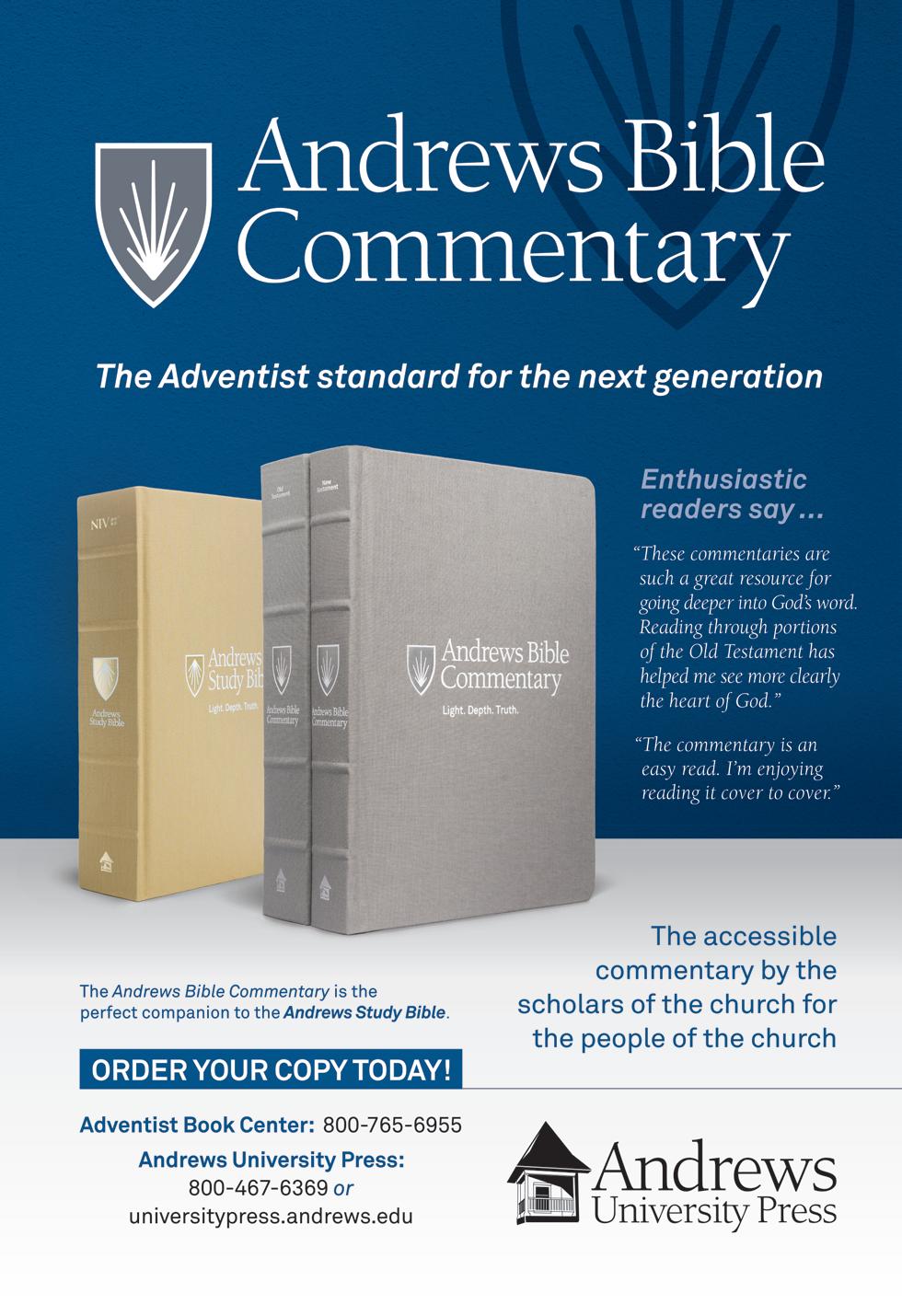SEPTEMBER 2024: ADDRESSING POLARIZATION IN THE CHURCH + HOW TO BECOME AN EXTREMIST + WHY EVIL? + THE SURVIVOR + WEATHERING STORMS


SEPTEMBER 2024: ADDRESSING POLARIZATION IN THE CHURCH + HOW TO BECOME AN EXTREMIST + WHY EVIL? + THE SURVIVOR + WEATHERING STORMS

Live in the Walla Walla Valley and streaming online Sept. 27 & 28

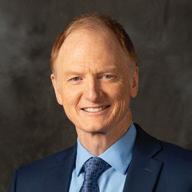

Evangelist, writer and president of It Is Written, John Bradshaw will speak the evening of Sept. 27 as well as during the Sept. 28 Sabbath worship service and at the Sabbath afternoon mission rally.

Featuring
• A visit from leaders of the work in India
• Frontline reports from the 10/40 Window
Students from Fountainview Academy will present a mini concert the evening of Sept. 27 and special music during the Sept. 28 Sabbath worship service and at the afternoon mission rally.
• Inspiring messages, music & fellowship
Location
Village SDA Church
715 SE 12th Street College Place, WA 99324





18 BEYOND BABEL | ANTE JERONČIĆ
The answer to polarization may be found around a kitchen table.
22 ADDRESSING POLARIZATION IN THE CHURCH | CRYSTAL E. WARD
When division shows up in the pew
28 HOW TO BECOME AN EXTREMIST | TORBEN BERGLAND
Be careful; we may be more extreme than ordinary.
“Much more could be said about polarization, yet its most profound tragedy lies in its contradiction of hospitality, arguably the core of Christian moral practice.”
30 WHY EVIL?
JOHN PECKHAM
It’s an age-old question that requires an answer.
34 WHY BELIEFS MATTER
TIMOTHY G. STANDISH
He was trained as a Darwinist but can’t escape the proof found in Creation.
36 THE INTEGRITY OF THE TESTIMONIES
ELLEN G. WHITE
A prophet’s struggle with those who questioned God’s voice.
40 PEOPLE OF THE BOOK NO MORE?
JONATHAN WALTER
Adventists love their Bibles, but can a digital device serve as a substitute?
44 CAN THE BIBLE COMPETE?
ERIC LOUW
Learning to actively engage in Bible study in a digital age
50 WEATHERING STORMS
MERLE POIRIER
The restlessness and outspoken seventies gave rise to controversies within the church.
54 WHEN GOD IS SILENT
L. JEAN SHELDON
Waiting for God to answer isn’t easy.
56 THE SURVIVOR
EUGENE B. YOUNG
It was one close call after another.
» Adventists in Iraq Celebrate the Church’s 100th Anniversary
» Evangelistic Meetings in South Sudan Draw Hundreds to God’s Word
» Adventists Open a Faith-based Cancer Hospital in Romania
» Two Church Regions Unite for “Made to Flourish” Women’s Convention
» Inauguration Highlights Redemptive Role of Adventist Education
» Adventist Leaders Commemorate 150 Years of Mission in Europe

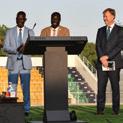
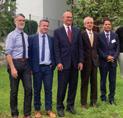
60 HOW CAN I CHANGE?
S. JOSEPH KIDDER AND EMILY ELLIS
Tips to changing the life of a believer
68 SILENT COMFORT
MAYRI CLARKE
Companionship and empathy may be all that’s needed.
72 FRANCIS DOLPHIJN NII LANTE THOMPSON
A homegrown missionary 50

EDITORIAL
5 JUSTIN KIM WALKING ON SAND
DEPARTMENTS
6 LETTERS
67 HOUSE CALL
68 EDITOR’S PICKS
COLUMNS
27 CLIFF’S EDGE CLIFFORD GOLDSTEIN
39 THE PIONEERING PASTOR SHANE ANDERSON
49 BEYOND BORDERS
KATIE WATERBROOK
65 TRANSITIONS
GERALD AND CHANTAL
KLINGBEIL
FOUNDED 1849. PUBLISHED BY THE GENERAL CONFERENCE OF SEVENTH-DAY ADVENTISTS®
PUBLISHING BOARD
Ted N. C. Wilson, chair
Guillermo Biaggi, vice chair
Justin Kim, secretary
Audrey Andersson, G. Alexander Bryant, Williams Costa, Paul H. Douglas, Mark A. Finley, James Howard, Erton Köhler, Peter Landless, Geoffrey Mbwana, Magdiel Perez Schultz, Artur Stele, Ray Wahlen, Karnik Doukmetzian, legal advisor
EDITOR Justin Kim
ASSOCIATE EDITORS Sikhululekile Daco, John Peckham
ASSOCIATE DIRECTOR Greg Scott
COMMUNICATION DIRECTOR/NEWS EDITOR Enno Müller
DIGITAL PLATFORMS DIRECTOR Gabriel Begle
ASSISTANT EDITORS Beth Thomas, Jonathan Walter
FINANCE MANAGER Kimberly Brown
ART DIRECTION AND DESIGN Brett Meliti, Ellen Musselman/Types & Symbols
LAYOUT TECHNICIAN Fred Wuerstlin
COPY EDITOR James Cavil
OPERATIONS MANAGER Merle Poirier
EDITORIAL ASSESSMENT COORDINATOR Marvene Thorpe-Baptiste
SENIOR ADVISOR E. Edward Zinke
AD SALES Glen Gohlke
CIRCULATION/DISTRIBUTION Rebecca Hilde, Sharon Tennyson
TO WRITERS: Writer’s guidelines are available at the Adventist Review Website: www.adventistreview.org and click “About the Review.” For a printed copy, send a self-addressed envelope to: Writer’s Guidelines, Adventist Review, 12501 Old Columbia Pike, Silver Spring, MD 20904. E-mail: revieweditor@gc.adventist.org.
Web site: www.adventistreview.org.
Unless otherwise noted, Bible texts in this issue are from the New King James Version. Copyright © 1979, 1980, 1982 by Thomas Nelson, Inc. All rights reserved. Bible texts credited to NIV are from the Holy Bible, New International Version Copyright © 1973, 1978, 1984, 2011 by Biblica, Inc. Bible texts credited to NRSV are from the New Revised Standard Version of the Bible, copyright © 1989 by the Division of Christian Education of the National Council of the Churches of Christ in the U.S.A. Used by permission. All rights reserved worldwide. Scripture quotations marked ESV are from The Holy Bible, English Standard Version, copyright © 2001 by Crossway Bibles, a division of Good News Publishers. Used by permission. All rights reserved. Scripture quotations marked NASB are from the New American Standard Bible, copyright © 1960, 1971, 1977, 1995, 2020 by The Lockman Foundation. All rights reserved.
Unless otherwise noted, all prominent photos are ©Getty Images 2024. The Adventist Review (ISSN 0161-1119) is the general paper of the Seventh-day Adventist® church. It is published monthly by the General Conference of Seventhday Adventists®, 12501 Old Columbia Pike, Silver Spring, MD 20904. Periodicals postage paid at Silver Spring, MD, and additional mailing offices. Postmaster: Send address changes to Adventist Review, P.O. Box 5353, Nampa, ID 83653-5353.
Copyright © 2024, General Conference of Seventh-day Adventists®. PRINTED IN THE U.S.A.
SUBSCRIPTIONS: Twelve issues of the monthly Adventist Review, US$19.95, plus additional postage outside North America. Single copy US$2.00 plus shipping and handling.
To order, visit adventistreview.org/subscriptions or send your name, address, and payment to: Adventist Review subscription desk, P.O. Box 5353, Nampa, ID 83653-5353
ADDRESS CHANGES AND SUBSCRIPTION QUERIES: adventistreview@pacificpress.com or call 1-800-545-2449
ADVENTIST REVIEW MINISTRIES OFFICE: support@adventistreview.org
THE MOST SHARED STORIES ON ADVENTISTREVIEW.ORG LAST MONTH:
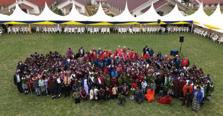
Momentous Inauguration Highlights Redemptive Role of Adventist Education, by Marcos Paseggi, Adventist Review
2

Is God’s Will Always Done? by John Peckham
3

Reporter’s Story on the
4 5

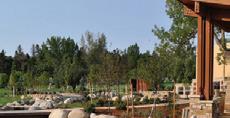
Pathfinder Camporee Will Offer More than 10,000 Hours of Volunteer Service, by North American Division News



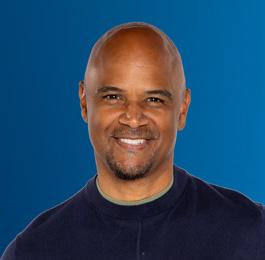


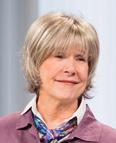
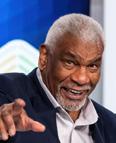






One beautiful Sabbath I walked the shores of Lake Michigan near our church’s flagship Andrews University. I soaked in the blueness of the clear sky, the slurping waves on the beach, and the stretched-out view of the shoreline. I decided to explore the shoreline and see how far I could get by walking. Thoughts of following Jesus on the lakeshore and poems about footprints in the sand came to my mind.
After about an hour I realized that I had been walking down a narrow pathway on the beach. But the object lesson was profound. One side was gritty, khaki-colored sand, made hot by the Sabbath sun. I had taken my sandals off, so though beautiful and firm to walk on, the scorching sand burned my bare feet.
The other side of the narrow way was the gentle yet ice-cold waves of Lake Michigan. The water was refreshing only after being burned by the hot sand. Relief was only temporary, however. After a couple of steps my feet went from one extreme of the Sahara to the other extreme of Siberia. Additionally, the wet sand was unstable. Each step caused my ankle muscles to recalibrate, causing me to slow down, stumble, or encounter some combination of the two.
The only recourse I had was a thin narrow strip of sand in
between. It was slightly damp from the previous tide, but it wasn’t unstable. It was warmer than the lake, but cooler than the heated sand. As the philosopher Goldilocks remarked: “It was just right.”
Initially I wasn’t conscious of where the water was and where the sand was. I was walking. After my feet burned and froze, I was focused on following this narrow strip. I was not making a halfway-point calculation and trying to walk in an averaged-out zone. In some parts the hot sand was wide; in other parts the cold water was wide. Although there was much space on either side, I sought to walk only on this ribbon of stable footing and perfect temperature.
In academia, theories must walk between the simple and the complex. In the universe, planets must not be too close to their stars, nor too far away, to sustain life. In economics, markets must balance spending and saving. In politics, representatives must fight either for the collective or for the individual. In communication, a healthy tension exists between efficacy and efficiency.
In theology, we walk between various poles: justification and sanctification; grace and works; principle and compassion; people and ideas; humanity and divinity; the first coming and the second
As the philosopher Goldilocks remarked: “It was just right.”
coming of Jesus; mercy and justice; ethics and spirituality; and many others.
The danger lies when we swing. We go from ice-cold feet in the water, and we want to get warm in the hot sand. While this provides temporary relief, we end up being burned and swinging back into the cold water. For example, some have swung to experience an extreme version of justification, only to be followed by an extreme version of sanctification. An exclusive experience in the former results in human passivity: since God has done everything, there’s really nothing left to the experience at all. An exclusive experience in the latter results in divine passivity: the onus is on human works to make things happen in the spiritual walk. This theological swinging results in people leaving the church because it is an untenable, unbiblical, and un-Christlike experience.
It’s much more profound than finding balance. It requires the wise, careful, and sensitive following of Jesus. As there were different sections of the lakeshore, different moments and stages of our lives require us to be spiritually deft while still being on that narrow strip of sand.
Master, save walking on water, teach me to walk on sand.
To all those mentioned by name in the July 2024 Adventist Review article “The Glory Days” and all other past and present Review team members who are alive, I would say a hearty thank-you. What memories! I started reading the Review late 1940s. It has been, ever since, part of my devotional life and a reminder to sacrifice in the present closing days of earth’s history. As we put away selfishness and self-indulgence, we can look forward to the latter rain falling in full measure. William Zelenak
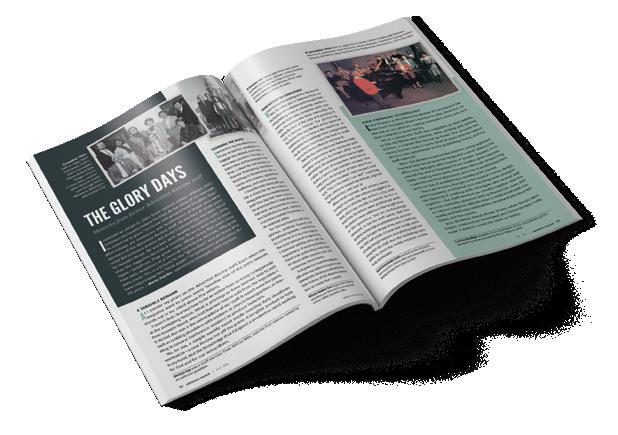
Fabulous! I know I’ll read this again and again.
Fabulous article package!
Thank you so much for your kind words as well as being a faithful reader of the Adventist Review. We also heard from many of our former staff members. While they had contributed individually to the article, they had not read the others. Clearly “The Glory Days” hit a note of nostalgia. Here are some of their comments, but without their names.—Editors
The 175th Anniversary issue came in the mail a couple of days ago. I made a beeline to “The Glory Days,” because I couldn’t wait to read what everyone wrote. What memories it all brought back! What nostalgia it all invoked! And what fun it will be some day when we all compare notes in the kingdom!
I commend the staff for giving the church this beautiful keepsake.
The trip to “glory” is delightful! Terrific issue.
This 175th issue turned out so well! Kudos on the effort.
Great job! Brings back many, many memories.
This firsthand account of a Billy Graham crusade by Elder Francis D. Nichol shared in “A Reporter’s Story on the Billy Graham Crusade” (July 2024) gives a good positive account of the event from an outsider perspective. I agree with his observations and comments. I have played piano and organ in a popular Sunday church for the past 34 years. When Graham came to Nashville, Tennessee, my boss, the
pastor, served on the crusade committee and shared a planning video with the congregation a full year in advance of the meetings. The video essentially pointed out that most people come into the church through the influence of friends and relatives, and made an excellent presentation of how to prepare for the meetings through friendship evangelism.
Billy Graham had what it took to appeal to all Protestant churches and did not offend one of our most prominent Adventist editors. Yet what we have that these other prominent churches don’t is medical missionary work, and we need to find ways to make this “right arm” a more prominent part of our gospel proclamation to these cities.
Albert Dittes
A thought with respect to John Peckham’s article “Is God’s Will Always Done?” (July 2024):
The Review has been part of my devotional life since the late 1940’s.
WILLIAM ZELENAK
Could “predestined” or “decided beforehand” be taken to mean that it was and is God’s purpose to save everyone—Adam and everyone afterward—until Jesus returns? I reverently restate John 3:16 to make my point: “For God so loved the world, that He decided beforehand to give His only begotten son, that whoever believes in Him would be saved.” In other words, it was decided beforehand that Jesus’ death could cover every one/everyone. Have I taken it too far?
William K. Weber
My response to John Peckham’s article, “Is God’s Will Always Done?” is “No.” God is not willing that any should perish, but many will. There would be no need to pray “Thy will be done” if His will was always done.
Mark Mirek (via Facebook)
Good start and well done! (in response to online column “Is it
We welcome your letters, noting, as always, that inclusion of a letter in this section does not imply that the ideas expressed are endorsed by either the editors of the Adventist Review or the General Conference. Short, specific, timely letters have the best chance at being published (please include your complete address and phone number—even with email messages). Letters will be edited for space and clarity only. Send correspondence to Letters to the Editor, Adventist Review, 12501 Old Columbia Pike, Silver Spring, MD 20904-6600; Internet: letters@adventistreview.org.
Time for a ‘Fundamental Story’?” by Adventist Review columnist Shawn Brace (July 14).
Dean C. Read (via Facebook)
I resonate with the poem “A Better Land,” by William H. Hyde (July 2024). O to be in the presence of the King!
Reb Ford
I appreciated Beth Thomas’ article “The Power of Fellowship” (June 2024). In response to her reflection about how we can, “in today’s fast-paced, overstimulated, and highly technical world, embody the same quality of fellowship as the disciples in Acts 2,” I’d state simply: remember the Sabbath day.
Rand Craft
If we didn’t have the ability to doubt, we would mindlessly go around accepting anything and everything. If we’re not wrestling with ideas, how could we ever know for ourselves the difference between truth and error? (comment on Adventist Review’s Instagram for “Doubt and the Smartest Person in Sabbath School” by Shane Anderson, posted July 24).
Simply_Rachelmarie (via Instagram)
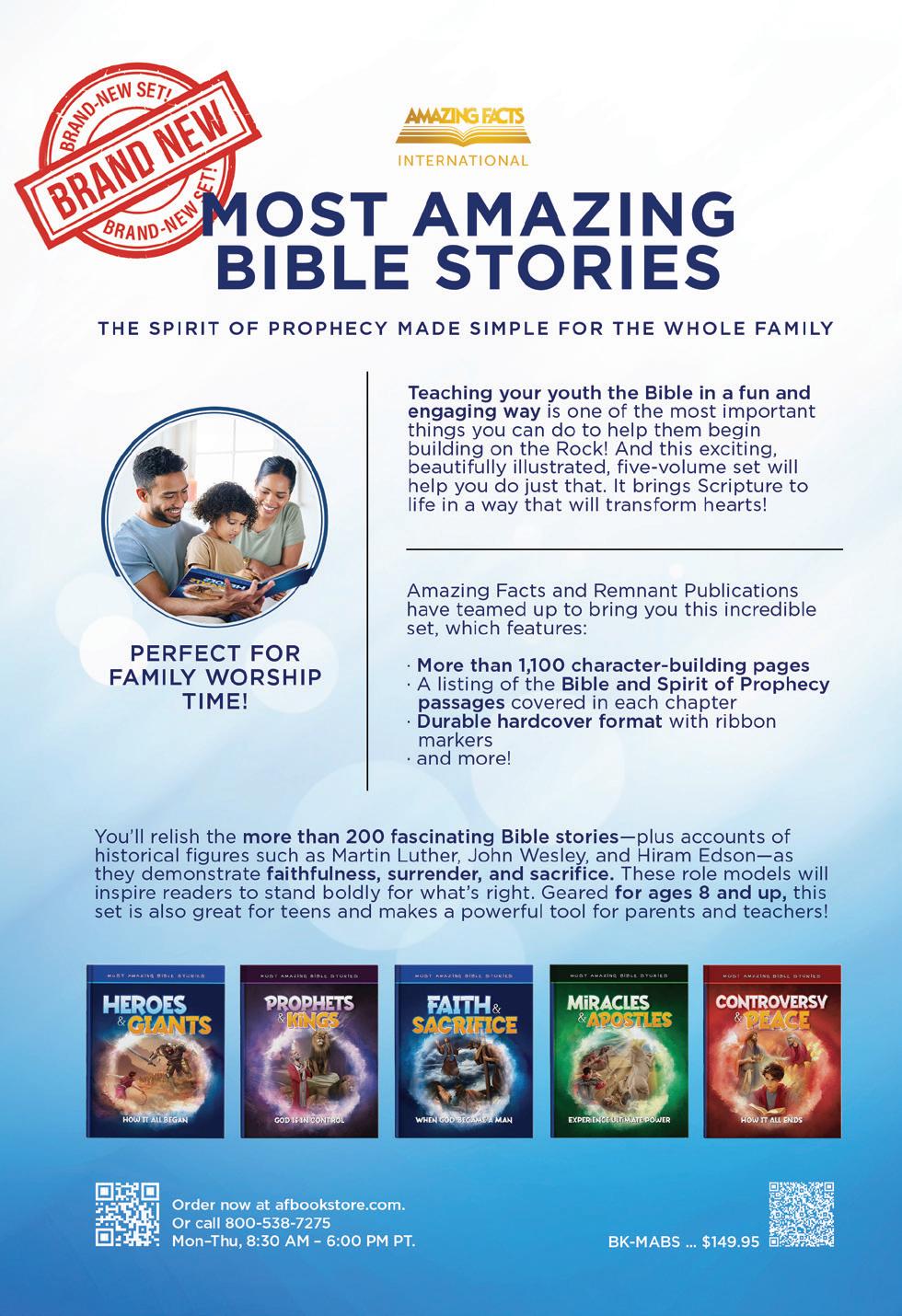
“It is God’s will that women should flourish.”
Virginia Baloyo, p. 14

COUNTRY LEADERS RENEW THEIR COMMITMENT TO RELIGIOUS FREEDOM.
MIDDLE EAST AND NORTH AFRICA UNION MISSION, AND ADVENTIST REVIEW
The Seventh-day Adventist Church in Iraq marked its 100th anniversary with a special centennial celebration in Erbil, Kurdistan, on Sunday, May 12. The event was graced by government representatives, church officials, and members from various denominations. While the main celebrations took place in Erbil, important government
meetings were held in the capital city of Baghdad.
Among the distinguished guests were Pshtiwan Sadq, minister of Endowments and Religious Affairs in the Kurdistan regional government; Attila Toth, Hungarian counsel representative in Kurdistan; Razmek Moradian, former Ishtar TV director; and Akad Yousif, Acad-
emy Society Club member in Erbil. Also present were Magdiel Pérez Schulz, assistant to the General Conference (GC) president; Elbert Kuhn, an associate secretary of the GC; Germán Lust, an associate treasurer of the GC; Rick McEdward, president of the Middle East and North Africa Union Mission (MENAUM); Darron Boyd, president
Adventist leaders met with Rami Joseph Aghajan (third from the right), head of the Christian, Yazidi, and Sabean-Mandaean Endowment Office in Iraq.
of the East Mediterranean Region; and George Yousif, legal association president of the Seventh-day Adventist Church in Iraq.
The celebration began with a heartfelt prayer of dedication offered by Boyd, who expressed gratitude to God for His guidance over the past century, leading the church to become what it is today.
In a special video message, GC president Ted N. C. Wilson extended his congratulations and appreciation. “It is my distinct pleasure to bring special greetings and congratulations to those attending the centennial celebration of the Seventh-day Adventist Church in Erbil. I especially want to thank the officials of the Kurdistan regional government and the Iraqi government for their commitment to freedom of religion and worship.”
Wilson continued, “The message of the Seventh-day Adventist Church is one of love and respect for all people as we seek to bring hope into a world facing enormous challenges. May each of you trust in the Almighty God.”
Yousif, a long-standing church leader in Iraq, recounted some of the struggles the church faced in the past. “The Seventh-day Adventist Church, like many other churches in Iraq, faced persecution, displacing, and bombing. We thank the Lord, however, that despite all of this, the damage to our buildings was limited to material losses and no one was hurt. The church plays an important role in society. It spreads the language of love, peace, and coexistence.”
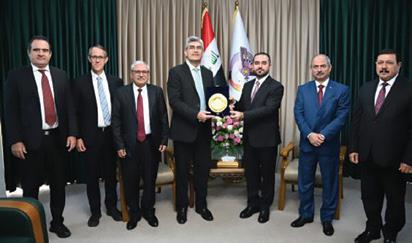
At the conclusion of the centennial celebration, church representatives Pérez Schulz, Kuhn, and Lust shared their vision for the work in Iraq, offering messages of encouragement to church members. Lust reflected on the church’s historical significance. “The 100 years of the [Adventist] Church in Iraq is significant because of the history of this country. Looking back, we can see the growth of members who, through their experience and resilience, have remained steadfast in the faith.”
Kuhn extended an invitation to those wishing to get involved. “Being here, I have seen many opportunities to advance God’s work in the region. That is why I invite everyone who has not yet decided to collaborate with God in this region. The work needs you; the Middle East needs you; but more importantly, you need this work.”
Pérez Schulz emphasized the sacrifices of the early followers. “With God’s help, they did the impossible to share the message of hope so that in the future, there would be a place to openly worship the Lord. We must remember that God has been with us in the past, and we fear nothing in the future. This is why we must be strong and continue to take firm steps forward to share the gospel and work for the Lord.”
The weeklong visit of church officials also included productive meetings with government representatives in Baghdad. On May 13 the church administration met with Raad Jabbar
Al-Khamisi, the administrative and financial undersecretary, and Khalil Shamo Khedida, the director general of Governorate Endowments. Rami Aghajan, head of the Office of Endowments for the Christian, Yazidi, and Sabian-Mandaean religions, referenced the Adventist Church in Baghdad, which has been closed for years. “We will strongly support keeping the doors of churches open and encourage the reopening of those that are closed.”
The next day, meetings were held with Iraqi prime minister Mohammed Shia’ Al Sudani, who affirmed that “the government views diversity as a strength for Iraqi society, enhancing unity and social peace, and is committed to preserving it.”
The Seventh-day Adventist Church in Iraq traces its origins back to Bashir Hasso, a young Iraqi pharmacist who purchased a copy of Daniel and Revelation from a Seventh-day Adventist colporteur. After receiving Bible studies from Walter K. Ising, the first foreign worker of the Adventist Church in Lebanon, Hasso returned to Iraq inspired, and shared the message of salvation with his family, forming the first Adventist movement in the country.
Today regional church leaders said the Adventist Church in Iraq “comprises members who, with unwavering faith, pray for a revival in the Middle East and for God’s continued protection as they share the love that Christ offers to each person.”
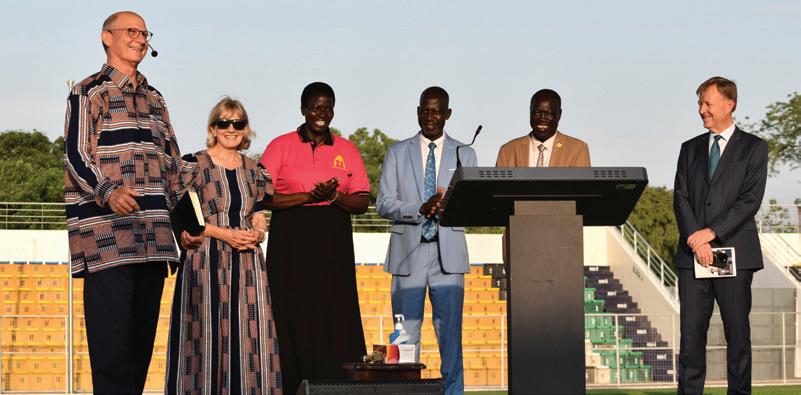
GC PRESIDENT TED N. C. WILSON LED ONE WEEK OF PREACHING.
MARCOS PASEGGI, ADVENTIST REVIEW
More than two hours before sunset on July 12 hundreds of people found their place in the stands of the Juba Football Stadium in preparation for another evening of the Homecoming evangelistic meetings in Juba, South Sudan.
From July 6 to 20 the two weeks of meetings in the capital of that eastern African nation crowned months of preparation and Bible studies with hundreds of interests and drew scores of others who expressed a desire to start studying the Bible.
In the first week of the meetings the guest speaker was Ted N. C. Wilson, president of the General Conference of Seventh-day Adventists. The meetings coincided with the celebration of South Sudan’s thirteenth anniversary since it became an independent country in 2011. As part of the celebration, Wilson, his wife, Nancy, and other regional Adventist Church leaders participated in a banquet, where he had the opportunity of sharing special remarks with South Sudan president Salva Kiir Mayardit and other government officials.
After July 13 Anthony Kent, associate director of the Ministerial As-
sociation at the General Conference, took over as the keynote speaker of the afternoon meetings.
“People are excited to hear the Word of God and are answering to the altar calls every evening,” Wilson said before the July 12 meeting. He explained that every evening, he made a point of making an altar call targeting a different group of attendees. While on Wednesday, July 10, Wilson made a general call for people to commit or recommit to God. On Thursday, July 11, the emphasis of the call was on people who have been studying the Bible for months in preparation for the Homecoming series and baptism.
On Friday the focus would be on calling those who had never answered to God but now had a desire to study the Bible, Wilson announced to regional church leaders before the July 12 meeting. “The focus in this case is not on immediate baptism but on starting Bible studies in preparation for a future ceremony,” Wilson said.
The July 12 meeting was also the first that Kent attended, as Wilson introduced him as the speaker for
the second week of meetings. “Pastor Kent is a man who loves the Word of God,” Wilson told the crowd. “You don’t want to miss it. I can assure you that you’ll be blessed.”
Several church choirs introduced the July 12 evangelistic meeting. Thanks to a powerful sound system, their voices could be heard from outside the stadium. Before the study of God’s Word led by Wilson, his wife, Nancy, as she had done every evening during the week, gave a brief health talk. Her July 12 presentation dealt with the importance of rest. “God created us with the need to rest,” Nancy Wilson said. “When we don’t take time to rest, our physical and mental life is affected. Our productivity decreases, even when we seem to work more.”
After his presentation, when the sun had already disappeared over the horizon, Ted Wilson appealed to attendees to take their commitment to God seriously. “If you have postponed your decision until now, today is the day,” he said. “God is inviting you to say, ‘Lord, I want to study the Bible; I want to get ready to become part of Your church.’ ” Dozens responded.
LEADERS HOPE TO SHARE A MESSAGE OF WHOLISTIC HEALTHFUL LIVING.
ADRIAN BOCANEANU, ROMANIAN UNION CONFERENCE, AND ADVENTIST REVIEW
Abrand-new oncology hospital in Romania has the potential to become a center of influence as it shares the Seventh-day Adventist principles of healthy living and serves those who most need it, regional church leaders said. The official inauguration of the Spitalul Oncologic Medex took place in Târgu Mureș on July 12 and 13.
Soon after the fall of Communism, Romanian Seventh-day Adventists showed a deep desire to share the light received in the area of healthful living with a wider spectrum of society. Working in a close relationship with the leadership of the church, missionary-minded physicians and businesspeople organized as Adventist-laymen’s Services and Industries (ASi) Romania began to build and establish lifestyle centers. Currently there are seven successful centers, with more in construction.
For the past few years the church has organized dozens of health expos, with tens of thousands benefiting from free tests and procedures, as well as classes in healthful living. The church also operates two schools of nursing.
For more than a decade leading ASi members had been praying and planning for what they considered the next frontier: an Adventist hospital. In consultation with the Adventist Church’s Romanian Union Conference and with the guidance of Richard Hart, president of Loma Linda University Health in Loma Linda, California, United States, the decision was made that it would be an oncology center. The incidence of cancer in the Romanian population is higher than average in the European union, and it is increasing.
The not-for-profit association established to build and operate the hospital is set up to follow the principles of health care adopted by the Adventist Church, treating every patient and employee as image bearers of God. Local Adventist churches in the area are being trained to support the patients and their families by prayer, practical help during hospitalization, and education for a healthy lifestyle after the treatment in order to maximize the results and prevent relapses.
In 2021 a 13-acre piece of land was secured just outside of the city of Târgu Mureș, in Romania’s central region. Ten of those acres were a donation made by an ASi
member. The construction started the following year. About that time, the Russian invasion of Ukraine seriously affected the building materials market, and energy prices skyrocketed. The Romanian government, appreciating the importance of this cancer hospital, offered a US $6.95 million grant.
The 115,000-square-foot construction was finished at the beginning of 2024. It includes 116 beds; 77 of them will be used in daily care. After visiting the facility, Peter Landless, General Conference (GC) Health Ministries director, said that “the hospital has been thoughtfully designed, and the building is of exceptionally high quality. The patient flow and treatment areas are conducive to promoting positive emotional and mental well-being, which is essential for patients who have cancer and face the protracted treatments that are needed.”
On the weekend of July 12 and 13, opening ceremonies culminated in the dedication of the facility as a center of healing, compassion, and hope. Founding members shared the story of the hospital and praised God for the miracu-

lous way He has shown His favor. In a message presented by a personal representative, the prime minister of Romania expressed his deep appreciation for this new oncological hospital and reaffirmed the support of the government for its activity.
Hart attended the ceremony. “By the way it was designed and equipped, I am confident this place will be a leader in cancer care,” he said. “Loma Linda is pleased to partner with this facility, particularly by sharing and developing the skills the staff may need. Bringing the spiritual dimension to cancer care is absolutely critical. Our prayer is that this place will provide answers to all patients coming here with their uncertainties about their future and the larger meaning of life.”
Leonard Azamfirei, an Adventist church member who is the dean of the local School of Medicine, said he envisions a strong connection of the university with the new hospital in the area of student rotations and specialized training of physicians.
Inter-European Division secretary Barna Magyarosi urged the
staff to “continue the healing work of Jesus Christ, working with compassion and committed to a wholistic vision of the medical work.”
At the conclusion of the ceremony, Aurel Neațu, president of the Romanian Union Conference, presented the facility and its staff before God in a dedicatory prayer.
The festivities continued on Saturday with a prerecorded message from GC president Ted N. C. Wilson. “God is going to use this hospital in a dynamic way,” Wilson said. “Much planning, much foresight, and much direction were given to the formation of this hospital. What an opportunity you have now as you put this into effect, that it will become a wonderful testimony and witness for the Lord. . . .
“Working in a synergistic way, under the guidance of the Holy Spirit, you will bring about an understanding of the way God can work for the healing of the patients, and not only physically, but also spiritually,” Wilson concluded.
Alexandru Rafila, minister of health in the Romanian government, expressed his deep appre-
ciation for the dedicated work of Adventist physicians, nurses, and volunteers in the health expos he has visited during the past two years. “I trust that this hospital will continue this tradition of competent care and compassionate service,” Rafila said. He also encouraged other denominations to follow the example of the Adventist Church in creating health programs for the underprivileged members of society.
Landless invited a group representing the medical and administrative staff of the hospital for an earnest prayer of dedication. He also urged all in attendance to pray at least once a week for the hospital, interceding with God on behalf of the patients and employees, and to use every possible way to show their support.
Following the ceremonies, a well-attended press conference resulted in headlines on various news outlets, both at local and national levels. Thousands of visitors used this opportunity to visit the hospital and were deeply impressed with the quality of the construction and the equipment, and the helpfulness of the staff.
Delegates proudly showcase their cultures during the recent Women’s Convention in Bangkok, Thailand.

EDWARD RODRIGUEZ, SOUTHERN ASIA-PACIFIC DIVISION, AND ADVENTIST REVIEW
More than 800 women gathered in Bangkok, Thailand, July 1821 for the Bi-Division Women’s Convention themed “Made to Flourish: Women’s Leadership Congress.” This event brought together women leaders from across the Southern and Northern Asia-Pacific divisions of the Seventh-day Adventist Church (SSD and NSD).
Delegates from more than 20 nations came together to inspire, fellowship, and renew their commitment to the church’s initiative to reach more people around the world. The convention emphasized the vital role of Adventist women in advancing the church’s mission, highlighting their unique contributions and the responsibilities God has entrusted to them.
SSD Women’s Ministries director Virginia Baloyo opened the plenary with powerful reminders of women’s responsibilities in the church’s mission. “It is God’s will that women should flourish,” Baloyo said.
In her welcome speech Baloyo quoted Adventist Church cofounder Ellen G. White to emphasize that women should exemplify the character of God in leadership, mission, families, and relationships.
“The concept of leadership extends beyond administration. Every Christian, every woman, is to represent Christ and serve as an
ambassador for Him and His kingdom,” Baloyo said. Delegates marched across the event platform, adorned in their beautiful national attire.
During the devotional Galina Stele, recently elected Women’s Ministries director of the church’s General Conference, delivered empowering insights that encouraged women delegates to deepen their understanding of their role in God’s mission. Stele inspired the delegates by reminding them of their identity and character in Jesus.
“When God looks at the seed, He already sees a tree, a flower, or a shrub. He already sees the fruits that the tree will bear. The same is true for us. . . . God sees every human being’s potential even before the child is born. He knows the full capacity we can display in this world,” Stele said.
In a video message, SSD president Roger Caderma warmly welcomed the women delegates. “I am encouraged to see every woman ready to go, reach, and light the world for Christ,” Caderma said. “As Jesus leads, let us remain faithful and hopeful as we continue to plant seeds of inspiration and faith, encouraging others to spread love, hope, and transformation.”
On Sabbath morning NSD Women’s Ministries director Raquel Arrais highlighted a beautiful moment when Yuriko Kumaoka, a delegate from Japan, joined her on stage carrying a poster with a phrase written in Kanji (Han characters). Yuriko, who is not a Seventh-day Adventist but considers Saturday as a blessed day of rest, was accompanied by other Japanese delegates as she held the poster that read “Sabbath Day.” Yuriko received a warm welcome from all the delegates.
Along with women leaders from NSD countries, Arrais shared the challenges they face and how the Lord has guided them in their mission within these mostly Buddhist and Muslims fields.
During the concluding part of the convention a special tribute was given to Heather Dawn-Small, the late GC Women’s Ministries director, who passed to her rest in January after facing challenging health conditions.
Arrais closed the convention with a powerful reminder in the face of adversity. “Life will be filled with challenges that may hinder our journey to follow Jesus,” she said. “Jesus’ presence does not mean that He will immediately end our adversity, but it means He will guide us through it.”
Drone view of Kajiado Adventist School and Rescue Center students, church leaders, guests, and donors on the inauguration day in Kajiado, Kenya.
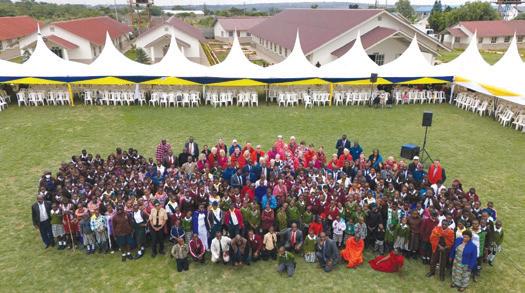
KAJIADO ADVENTIST SCHOOL AND RESCUE CENTER IS TRANSFORMING LIVES IN KENYA.
MARCOS PASEGGI, ADVENTIST REVIEW
Acloudy day could not overshadow the wide smiles of regional church leaders, special guests, donors, staff, and students of Kajiado Adventist School and Rescue Center as they met on the completely renovated campus for the official inauguration ceremony in Kajiado, Kenya, on July 11.
The ceremony included the unveiling of a plaque, a traditional Maasai welcome, words from the leaders, songs and prayers, and the official presentation of the institution’s keys to the regional church administration.
The July 11 ceremony crowned six years of hard work since Adventist independent supporting ministry Maranatha Volunteers International arrived at Kajiado with the goal of revamping the institution. Since 2000 the school had been a beacon for Maasai girls from the area who ran away from an early marriage and female genital mutilation (FGM). Even though FGM is illegal in Kenya, it is still practiced mostly in isolated villages in the highlands, much to the chagrin of law enforcement.
With the help of police, some girls have managed to reach the Adventist school, where they find food, shelter, and a wholistic Adventist education. Others have escaped by themselves to arrive, often fainting, at the main gate of Kajiado.
When Maranatha first arrived at Kajiado in 2018, the future of the school was in danger. Overcrowding, lack of resources, shoddy infrastructure, and insufficient water supply threatened its survival. But after months of fasting and prayer, the abundance of newfound water allowed Maranatha to transform the campus from a bare, dust-filled place to a multicolored garden with lawns, shrubs, and flowers.
During the ceremony church leaders emphasized the missional potential of the new school. “This [school] is not for decoration,” Blasious Ruguri, president of the Adventist Church’s East-Central Africa Division, told those present. “This is a missionary center.” He added, “We want these teens, this school, to become a blessing.” The goal, Ruguri emphasized, is that when students leave Kajiado, they may be scattered all over the continent to share the message of Jesus and His salvation.
As part of the inauguration, Maranatha president Don Noble handed the keys of the Kajiado school to the South Nairobi Kajiado Field administration, represented by president Kenneth Onchana. A transition team has been working with the school board and
other church leaders to ensure the long-term viability of the project once Maranatha leaves the school.
Anu Kedas, Maranatha country director in Kenya, dedicated the campus “to God . . . and to the students who will study in these classrooms, enjoy these buildings, and get out of those gates being someone in life and celebrating life.”
Maranatha leaders have shared how the students who already graduated from Kajiado have learned trades and are doing well in life. At least seven of those graduates are already pursuing a college degree, they reported. “These students have found a hope and future here,” they said. “They have found God, and they have found a family.”
It is perhaps the reason that the plaque unveiled on July 11 included a Bible verse Maranatha leaders chose to mark the occasion. They selected 2 Corinthians 6:18. During the ceremony Noble read the verse in a loud voice: “ ‘I will be your Father, and you will be my sons and daughters, says the Lord Almighty’ [NLT].”*
* Texts credited to NLT are from the Holy Bible, New Living Translation, copyright © 1996, 2004, 2015 by Tyndale House Foundation. Used by permission of Tyndale House Publishers, Inc., Carol Stream, Illinois 60188. All rights reserved.
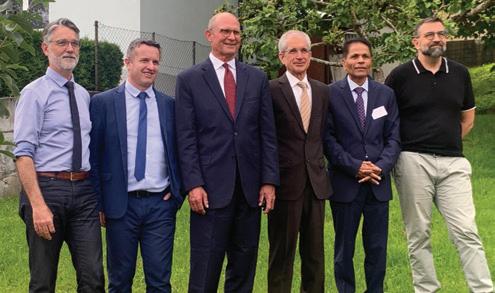
CELEBRATION REMEMBERED JOHN N. ANDREWS, WHO ARRIVED IN 1874.
FRANCO-BELGIAN UNION CONFERENCE, WITH INTER-EUROPEAN DIVISION NEWS, AND ADVENTIST REVIEW
In a festive and solemn atmosphere, the French-Italian Swiss Conference and the German Swiss Conference of the Seventh-day Adventist Church celebrated a historic milestone in Tramelan and Saignelégier, Switzerland, on July 5-6. The event marked what church leaders called a historic milestone: the 150th anniversary of the sending of the first official Adventist missionary to European soil.
For the occasion, the Swiss Union Conference welcomed several Adventist leaders, including General Conference president Ted N. C. Wilson and his wife, Nancy. In his remarks Wilson said he was touched by the spirit of religious liberty that Switzerland enjoys. The same mission that drove the ministry of Andrews is the one that should compel us today to keep moving forward, he said. “It is a mission that calls us to help our neighbor as much as possible in every facet of life and not only spiritually,”
John Nevins Andrews (1829-1883) was the first official Adventist missionary sent to Europe. He arrived in Switzerland in 1874, marking the beginning of the organized Adventist mission on the European continent. A theologian and scholar, Andrews
was proficient in several ancient and modern languages.
Andrews contributed significantly to the development of Adventist doctrine and the expansion of the church in Europe. His translation and publication works were crucial to the spread of the Adventist message across the continent. Andrews is considered one of the most influential founders of the Adventist movement, having played a key role in establishing the church outside of North America.
To commemorate Andrews’ arrival 150 years ago and as part of the celebration, Swiss Union Conference president Olivier Rigaud placed a sign by the newly planted tree in the village of Tramelan to commemorate the occasion. During a later refreshment time, a group of Adventist pastors met with representatives of the Reformed Church, the pastor of the Evangelical Church, and the Officer of the Salvation Army from Tramelan.
The July 5 evening program ended with a spiritual welcoming of the Sabbath at sunset. Those who stayed enjoyed singing hymns and a message by Wilson.
One of the highlights of the July 6 program in Saignelégier, was the
official welcome of a new missionary, Jonathan Contero, and his family. Contero will conduct his ministry in the city of Geneva. This new ministry, supported by the General Conference, represents a strong symbol of the continuity of the Adventist mission and its commitment to proclaiming the return of Jesus. The choice of Geneva, a cosmopolitan city and headquarters of numerous international organizations, underlines the universal dimension of the Adventist message.
The afternoon was filled with captivating historical presentations that traced the saga of Adventist mission in Europe and several interactive workshops that provided deeper reflection on the challenges of mission today. A museum, set up for the occasion, exhibited precious objects including the desk on which Ellen G. White wrote part of her flagship work The Great Controversy during her stay in Europe.
“The celebration in Saignelégier was much more than a commemoration of the past,” regional church leaders said. “It was an opportunity to strongly reaffirm the relevance of the Adventist message and to turn, with enthusiasm, toward the future of the mission in Europe and in the world.”

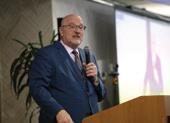

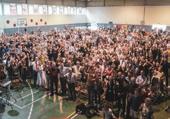


IN MELBOURNE, ADRA SHARES FUN AND PROVIDES SUPPORT TO FAMILIES FROM GAZA. The Adventist Development and Relief Agency (ADRA) in Victoria, Australia, hosted 86 families of recent arrivals from Gaza at a Family Fun Day on July 14. ADRA volunteers and members of local Seventh-day Adventist churches have been supporting the families with food, furniture, clothing, and bedding. This day featured lunch provided by members of the Samoan Adventist community, live music, referrals to legal services, and art and games for the children.
“AS CHURCH LEADERS, YOUR ROLE IS TO PROTECT THE SHEEP.” Loss is part of our world, said James Winegardner, president of Adventist Risk Management (ARM). His presentation took place during the third and last day of the Segment of Leadership Development Conference at the Inter-American Division headquarters in Miami, Florida, United States, on July 24. In his plenary session he sought to explain what risks are involved and how to manage and minimize them.
ALBANIAN MISSION THRIVES WITH VOLUNTEER PARTNERSHIP. On May 16 Manado Adventist Hospital (Rumah Sakit Advent Manado, RSAM) in North Sulawesi, Indonesia, held a groundbreaking ceremony for its new Building C. This event marked the start of the third phase in the hospital’s ongoing expansion of its medical facilities. The ceremony took place at the RSAM compound in Manado. The project underscores RSAM’s dedication to enhancing service and care through its healing ministries.
SAGUNTO ADVENTIST COLLEGE CELEBRATES 50 YEARS OF WHOLISTIC EDUCATION. The college celebrated its fiftieth anniversary in Valencia, Spain, July 12-14. The commemoration took place in the campus sports center, with more than 1,200 attendees who enjoyed a series of activities and events designed to salute a half century of “Educating for Eternity.” The three days became a time for reuniting many alumni, faculty, and staff. Smiles and hugs were a constant throughout the weekend, highlighting the spirit of community and brotherhood.
THAN
ON MISSION. A gathering of Adventist chaplains from across the South American Division brought together more than 600 participants at Brazil Adventist University (UNASP) in São Paulo, Brazil, July 8-10. With the motto “One Call, One Mission,” the event sought to encourage chaplains to stay focused on mission and have a positive impact on the institutions they serve. Chaplains are usually those responsible for leading and coordinating spiritual activities in such Adventist institutions as schools, hospitals, and media outlets, among others.
Seeking to reach people outside their walls, more than 200 Adventist churches across North America, recently hosted the short mental health series MindFit. The Voice of Prophecy media ministry produced the event to empower churches to be practical and spiritual resources for their communities in battling a continent-wide mental health crisis. The series sheds light on the history and prevalence of mental health challenges. It emphasizes that effective treatments are available and amplified by biblical principles.
To receive our weekly newsletter highlighting current news, inspiring stories, thought-provoking commentaries, engaging features, and other media, sign up today.
www.adventistreview.org/newsletter-signup
Toward a depolarizing hospitality
ANTE JERONČIĆ

Some years ago I engaged in a lively conversation with a friend about the intricate nature of morality, specifically questioning whether ethics is inherently influenced by cultural contexts. We expounded on various forms of relativism, the many ways moral language has become incoherent in our society, and the sources of authority that should guide our ethical decision-making. Referencing recent events in Afghanistan, my friend asserted: “If a person cannot instantly declare that throwing acid in the faces of little girls who wish to attend school is morally evil, then I have nothing more to say to them.” In other words, if the egregiousness of such an act is not self-evidently clear, no further argument could possibly persuade. This failure to comprehend would amount to moral obtuseness beyond the pale.
These words still resonate with me—not only because they underscore the necessity of moral absolutes but also because they highlight the reality of irreconcilable dilemmas. At times, seeking compromise is not merely a concession but a profound betrayal of one’s faith. Life often presents stark dichotomies that we should not attempt to reconcile. Along such lines, the Bible compels us to choose between God and Baal (1 Kings 18:21), warns against serving both God and mammon (Matt. 6:24), contrasts paths leading to life or death (Matt. 7:13, 14), and advises building our foundation on the rock rather than sand (verses 24-27). These narratives, emblematic of what the Christian writer Søren Kierkegaard calls “either/ or situations,” demand our unconditional obedience and, with it, the dispensing of any middle ground. According to him, to falter in this complete allegiance means not loving God—and, by extension, “hating him.”1

While some may deem such binaries too rigid, they underscore an essential truth: in some cases, clear, decisive, this-or-that stances are not only appropriate but necessary. In the face of overt evils— torture, racial bigotry, and sexual violence—entertaining nuances or “shades of gray” constitutes not only insensitivity but moral depravity. On that point, too, the Bible offers numerous examples, including Paul’s stark admonition of anyone presenting a false gospel: “Let him be accursed” (Gal. 1:8). His strong language emphasizes the need for unyielding clarity in matters central to faith, in “here I stand” moments upon which the church stands or falls.2 In these instances a kind of polarized thinking—choosing a clear side decisively—becomes crucial for upholding integrity and faithfulness.
In contemporary discourse, however, “polarization” often carries connotations beyond decisiveness. It refers to a pervasive state of division and antagonism that affects how individuals and communities interact. It is not just about stances but also how positions are expressed and how we relate to others, particularly those viewed as adversaries. Riding on volatile emotions and rigid judgment of outsiders, polarization, by its very nature, can lead to profound fragmentation within communities, rendering it difficult to find common ground or pursue the common good. It effectively mirrors the Tower of Babel narrative—a symbol of misunderstanding and discord. Thus, polarization is no trivial matter.
Properly understanding polarization requires a multifaceted approach, integrating insights from history, sociology, political science, and social psychology. Yet crucially, as believers, we must
also delve into the moral and spiritual dimensions that deeply influence how we confront this issue. What does polarization reveal about our collective and individual character? What impact does it have on our spiritual life and pursuit of God’s kingdom (Matt. 6:33)? These questions are crucial because polarization transcends mere “flesh and blood,” involving the realm of “principalities” and “powers” (Eph. 6:12)—spiritual forces of darkness driven by the “father of lies” (John 8:44, NIV). Historically, these forces have effectively sown division and discord through insinuations and half-truths. This kind of polarization, by its very nature, possesses a diabolical aspect to it.
This issue calls for vigilance and critical self-honesty, requiring repentance and prayer to avoid demonizing and dismissing others as irredeemably wrong. Unfortunately, many Christians adopt rigid ideological frameworks that skew their perception of others, fostering suspicion and hostility toward those with differing views. To combat this, we must acknowledge that truth can come from unlikely sources—as illustrated by the biblical stories of Balaam’s donkey (Num. 22:2139) and Pharaoh Necho conveying God’s message to King Josiah (2 Chron. 35:20-27). Or, as the theologian Karl Barth once quipped, “God may speak to us through Russian Communism, a flute concerto, a blossoming shrub, or a dead dog. We do well to listen to Him if He really does.”3
We should note here that simplistic narratives such as “all supporters of X are really Y” are often exploited by demagogues, a key point in Hannah Arendt’s seminal work, The Origins of Totalitarianism. 4 Arendt shows how societies riddled with deep divisions and mutual distrust, fueled by denigrating language used to describe others, become fertile grounds for authoritarianism. In such environments people may gravitate toward authoritative figures promising to resolve deep-seated conflicts and grievances. Therefore, polarization fosters a dynamic interplay of rigidity and susceptibility to manipulation. Given this context, it is essential to critically evaluate polarized messages and their
In a polarized world, true hospitality isn’t just vital; it is transformative.

distorted constructions of reality. We must ask: Who benefits from these divisions? Who is fueling them? Who gains power, influence, money, or reputation from these perceptions?
A brief caveat is necessary here. It is crucial to understand what polarization is not. Strong disagreements, debates, and harsh criticisms do not inherently constitute polarization. In fact, the absence of such vigorous discourse often signals the shutting down of openness to new information and contradictory viewpoints. For instance, the Apostolic Council at Jerusalem (Acts 15) showcases a heated debate regarding whether Gentile converts to Christianity needed to observe Jewish law. While this discussion was intense and aimed at discerning truth and maintaining unity within the diverse body of believers, it did not completely resolve the issue. As reflected in Paul’s epistles, particularly Galatians, this matter continued to be a source of significant contention within the community. This highlights that while the council demonstrated a commitment to addressing complex theological issues through dialogue, the process of dealing with polarization is ongoing and does not always result in immediate harmony. In short, robust debate enriches public discourse, whereas polarization stifles it, creating barriers that hinder mutual understanding and respect.
This ideal of debate can often be compromised by underlying narcissism, in which what seems to be concern for “truth” may actually cloak a deep-seated resistance to correction. On this point Adam Grant offers insightful analysis. He argues that overconfidence obscures our recognition of opposing viewpoints, greatly hindering productive dialogue and mutual understanding.5 Individuals often enter discussions with prosecutorial zeal, aiming not merely to discuss but to win, or with fervor intent on converting others to their viewpoint. Such attitudes, Grant notes, run counter to the scientific mindset, which values inquiry, testing, and revising beliefs based on new evidence. Thus, he advocates intellectual humility and adaptability, which are essential traits for countering the effects of polarization.
Viewed from a Christian perspective, much of this makes sense as we consider core traits of fallen human nature—traits that inherently resist truth and truthfulness. We display tendencies of truth resistance, such as pride, indifference, and an unwillingness to remain teachable. We often don’t want to hear the truth, that is, information and input that goes against our desires, commitments, and interests. The apostle Paul rebukes such “itching ears” (2 Tim. 4:3), surrounding ourselves with teachers who approve of what we want, as one of the defining characteristics of this age. While more could be said on this point, so much is clear: denigrating intellectual virtues such as receptivity, humility, curiosity, and openness cuts from the lifeblood of vibrant spiritual living. These virtues are essential for learning from others,
advancing in understanding, and remaining receptive to the transformative movements of the Holy Spirit. In turn, when we give in to polarization, we not only isolate ourselves from these virtues but also sever our attunement to the Holy Spirit. This disconnection hinders our spiritual growth and reduces our capacity to engage meaningfully with others. In stark contrast, the Bible implores us to adopt a posture of humility and openness. For instance, James 1:19, 20 exhorts us to be “quick to listen, slow to speak and slow to become angry” (NIV), underscoring the importance of teachability and patience. Similarly, Proverbs 18:15 states, “The heart of the discerning acquires knowledge, for the ears of the wise seek it out” (NIV), highlighting the critical value of a curious and receptive spirit. Perhaps another word of caution is warranted here. The critique of polarization can sometimes become implicated in the “politics of polarization” itself. When we label others as “polarizing,” we may implicitly or explicitly elevate our stance to a moral, intellectual, or spiritual high ground. Often such labels are applied to those whose views we perceive as “extreme,” “rigid,” “simplistic,” or “overwrought,” while we consider our own position “balanced” or “moderate.” This represents “false centrism,” a cognitive bias that leads us to see our own opinions as reasonable and all others as extreme. It can distort our understanding of true diversity, misleadingly positioning our perspectives as the norm. By recognizing others as sources of polarization, we often expose similar tendencies within ourselves, underscoring the need for deeper introspection and humility.
Much more could be said about polarization, yet its most profound tragedy lies in its contradiction of hospitality, arguably the core of Christian moral practice. Genuine hospitality—in Greek, philoxenia, or “the love of the stranger”—generously embraces, suspends judgment to truly listen, and finds enrichment in differences. It creates a space in which everyone feels valued without fostering indifference or false commonality. True hospitality respects and dignifies without being naive or indifferent. In a polarized world, such hospitality isn’t just vital; it is transformative. In his Free of Charge Miroslav Volf shares an account that illustrates the depolarizing power of
genuine hospitality. It is the story of Ivo Marković, who, like many people during the war in the former Yugoslavia (1991-2001), suffered grave personal loss when the Bosniak-led Bosnian army massacred several elderly people in the village of Šušanj, including his father. After the war he returned to the town to visit the house where his brother had lived, only to be warned that “a fierce Muslim woman” had, in the meantime, claimed it for herself. Indeed, when he got there, the woman was waiting for him, cigarette in her mouth and rifle cocked. She barked: “Go away or I’ll shoot you.”
“ ‘No, you won’t shoot me,’ said Father Marković in a gentle but firm voice, ‘you’ll make a cup of coffee for me.’ She stared at him for a while, then slowly put the rifle down and went to the kitchen. Taking the last bit of coffee she had, she mixed in some already-used grounds to make enough coffee for two cups. And they, deadly enemies, began to talk as they partook in the ancient ritual of hospitality: drinking coffee together. She told him of her loneliness, of the home she had lost, of the son who never returned from the battlefield. When Father Marković returned a month later she told him: ‘I rejoice at seeing you as much as if my son had returned home.’ ”6
Such stories remind me of the power of simple, grace-filled gestures to upend the circular logic of polarization and intolerance. These hospitable gestures can come in different forms: an act of listening, a suspension of judgment, an expression of kindness, or an act of blessing. They foster a feeling of solidarity with broken humanity, and when tied to faith, truth, and proper moral sensibilities, they are premonitions of the kingdom of God. As an end-time people, can we have any greater calling?
1 Søren Kierkegaard, Provocations: Spiritual Writings, ed. Charles E. Moore, 1st ed. (Farmington, Pa.: Plough, 1999), p. 11.
2 I explore some of these issues in Ante Jerončić, “The Liminal Church: Exilic Consciousness and Adventist Theopolitics,” Andrews University Seminary Studies 50, no. 2 (2012).
3 Karl Barth, Church Dogmatics (Edinburgh: T & T Clark, 1975), vol. 1, part 1, p. 55.
4 Hannah Arendt, The Origins of Totalitarianism (New York: Harcourt Brace Jovanovich, 1973)
5 Adam Grant, Think Again: The Power of Knowing What You Don’t Know (New York: Viking, 2021).
6 Miroslav Volf, Free of Charge: Giving and Forgiving in a Culture Stripped of Grace (Grand Rapids: Zondervan, 2005), pp. 190, 191.
Ante Jerončić is professor of theology and ethics and chair of the Department of Theology and Christian Philosophy at the Seventh-day Adventist Theological Seminary, Andrews University, Berrien Springs, Michigan.

A biblical approach
CRYSTAL E. WARD
In Matthew 12:22-28 the story is told of a demon-possessed man who was blind and mute and was brought to Jesus for healing. After Jesus healed the man, the crowd posed the question: “Could this be the Son of David?” The crowd was not yet convinced; the evidence of the healing, however, made them ponder the truth about Jesus. The question from the crowd piqued the curiosity of the Pharisees. In the Pharisees’ refusal to accept the possibility that this could indeed be the Son of David, they said: “This fellow does not cast out demons except by Beelzebub the ruler of the demons.” The Pharisees sought to discredit the idea of Jesus as the Son of David by attributing His power to cast out the demons to Satan. Jesus, knowing their thoughts, responded: “Every kingdom divided against itself is brought to desolation, and every city or house divided against itself will not stand: And if Satan casts out Satan, he is divided against himself. How then will his kingdom stand?”
Jesus’ response in this story brings to light the danger of division, the danger of polarization. Jesus stated it plainly: a kingdom divided against itself is brought to desolation, and every city or house divided against itself cannot stand. In simple terms, division lacks power! In The Desire of Ages Ellen G. White shares the following on this biblical passage: “Christ told [the Pharisees] plainly that in attributing the work of the Holy Spirit to Satan, they were cutting themselves off from the fountain of blessing.”1
When we think about the condition of our church today, it is evident that one of the enemy’s tactics is to destroy the church through polarization. There is so much division on various issues. The increase in polarization detracts from the ultimate mission of the church. In The Acts of the Apostles there is a clear statement regarding the work of God’s church: “The church is God’s appointed agency for the salvation of men. It was organized for service, and its mission is to carry
the gospel to the world. From the beginning it has been God’s plan that through His church shall be reflected to the world His fullness and His sufficiency. The members of the church, those whom He has called out of darkness into His marvelous light, are to show forth His glory. The church is the repository of the riches of the grace of Christ; and through the church will eventually be made manifest, even to ‘the principalities and powers in heavenly places,’ the final and full display of the love of God.”2 With such an important mandate, there is no doubt as to why the devil has made it a priority to attack the church. A divided church will have little to no impact to do the work that God has called for us to do in these last days, and for that reason it is important for pastors and members to address polarization in the church.
While the Bible must serve as our ultimate guide for foundational principles on every topic, in addressing the impact of polarization it is also important to consider the influence of worldview. Worldview is defined as “a comprehensive framework of ideas and attitudes about the world, ourselves, and life, a system of beliefs, a system of personally customized theories about the world and how it works—with answers for a wide range of questions.”3. This definition considers not only the beliefs and ideas that one has, but also the interpretation of those beliefs in the world around us. Addressing polarization in the body of Christ will require a multifaceted approach to understanding Scripture and worldview with the goal of unification through the leading of the Holy Spirit. If not addressed effectively, polarization can exacerbate misunderstandings, impede willingness to find common ground, and inhibit effective communication among members, thus leading to a dysfunctional and unproductive church.
Below are 10 steps that could prove to be effective in addressing polarization in the church, regardless of the topic:
1. PRAYER FOR UNITY. It is important to make the topic of polarization a matter of prayer. Praying specifically for unity and wisdom within the church. Encouraging one another to pray for each other, especially for those with differing views on various topics. Ephesians 4:3 reminds us to “make every effort to keep the unity of the Spirit through the bond of peace” (NIV).
2. EMPHASIZING CORE CHRISTIAN VALUES. It is important to focus on the key teachings of Jesus, such as compassion, love, service, and humility. We must remember that our identity is found in Christ, not in our political, economic, or social affiliations. With an emphasis on Christ, the mission of the church will organically be prioritized. Philippians 4:8 reminds us of the values of such a focus: “Finally, brethren, whatsoever things are true, whatsoever things are honest, whatsoever things are just, whatsoever things are pure, whatsoever things are lovely, whatsoever things are of good report; if there be any virtue, and if there be any praise, think on these things” (KJV).
3. FOSTERING A SAFE SPACE FOR OPEN DIALOGUE. It is important to have a space where topics can be discussed openly and respectfully. The goal is to encourage active listening and understanding versus promoting a forum of debate. The pastor or church elder should seek to facilitate a discussion on the items most pressing in the congregation. This forum should address the concept of worldviews and how it shapes our beliefs and values.
4. PROMOTING BIBLICAL LITERACY. It is important to encourage a prayerful study of the Word of God together, as the Bible should be our guidebook on all topics. The entire biblical canon should be utilized to gain insights. As Isaiah 28:10 points out: “For precept must be upon precept, precept upon precept, line upon line, line upon line, here a little, there a little.” In his book Canonical Theology, John Peckham states that “a canonical ‘system’ looks beyond (without overlooking) the limits of individual texts and passages, viewing its parts in light of the whole and its whole in light of its parts without imposing one upon the other.”4 Through intentional exploration of the entire canon, the Holy Spirit will provide greater insights on topics.
5. ENCOURAGING SERVICE. When we work together toward a common goal, it helps to foster a deeper sense of community, shared
mission, and purpose and promotes effortless communication. Engaging in service together will create an easier platform to discuss more challenging conversations.
6. ACCENTUATING COMMON GROUND. We must help each other recognize the areas of commonality. Regardless of the topic, there are always areas of common ground. The differences usually vary on approach; the end goal, however, is often similar. When more emphasis is placed on the end goal, the possibility for unity is increased, and Christ-centered values are more pronounced.
7. PROVIDING EDUCATION ON TOPICS IN DEBATE. Many church disputes are driven by opinions versus factual data. It is important to provide factual data on the topic at hand. If the topic is political in nature, nonpartisan educational sessions on political issues from a Christian perspective may prove to be helpful. This can help understand different viewpoints and make informed decisions. We should also understand that not every personal view or value needs to be made into law. God values free will, and Christians should seek to ensure that freedom is protected.
8. TEACHING CONFLICT RESOLUTION. Conflict is inevitable wherever people are present. The goal should not be conflict avoidance, but conflict resolution. By equipping and teaching the biblical principles of peacemaking and conflict resolution, as outlined in Matthew 18, we will be more adept at handling disagreements constructively.
9. MODELING UNITY FROM LEADERSHIP. There is a quote from a poem by Edgar Guest that states: “I’d rather see a sermon than hear one.” It is important for pastors and church leaders not simply to preach the principles of unity, but to model the principles of unity. The pulpit should not be used as a platform to push political or religious agendas, but should focus on biblical teaching and principles that transcend the polarizing views in
The increase in polarization detracts from our ultimate mission.

society. There is only one guaranteed method to reach people for the kingdom, and that is Christ’s method: “Christ’s method alone will give true success in reaching the people. The Savior mingled with men as one who desired their good. He showed His sympathy for them, ministered to their needs, and won their confidence. Then He bade them, ‘Follow Me.’”5
10. CELEBRATING DIVERSITY. We should encourage one another to embrace and celebrate the diversity within the church as a strength. Approaching differing perspectives from a place of unity will foster a deeper and richer understanding of how to reach people from all walks of life while enhancing our personal understanding of various topics.
Polarization within the body of Christ is not a new phenomenon. All throughout Scripture we see evidence of division in the church: the tribes in the Old Testament, conflicts within the early church, differences between Jews and Gentiles, and the present issues in our church today. Though the challenges of polarization may remain with
us until Jesus’ return, we must remember that there are biblical principles that can help us overcome division and focus on God’s greater purpose—the salvation of souls.
The apostle Paul stated it best in 1 Corinthians 1:10: “I appeal to you, brothers and sisters, in the name of our Lord Jesus Christ, that all of you agree with one another in what you say and that there be no divisions among you, but that you be perfectly united in mind and thought” (NIV). For us to complete the work that God has called us to do, let us embody this call to unity so that we will reflect God’s ideal for His appointed agency on earth.
1 Ellen G. White, The Desire of Ages (Mountain View, Calif.: Pacific Press Pub. Assn., 1898, 1940), pp. 321, 322.
2 Ellen G. White, The Acts of the Apostles (Mountain View, Calif.: Pacific Press Pub. Assn., 1911), p. 9.
3 B. Sanou, “The Impact of Worldview on the Theological and Missiological Thought and Praxis of the Seventh-day Adventist Church,” Journal of Adventist Mission Studies 11, no. 2 (2015): 12-23.
4 J. Peckham, Canonical Theology: The Biblical Canon, Sola Scriptura, and Theological Method (Grand Rapids: Eerdmans, 2016).
5 Ellen G. White, The Ministry of Healing (Mountain View, Calif.: Pacific Press Pub. Assn., 1905), p. 143.
Crystal E. Ward serves as the executive pastor at Spencerville Seventh-day Adventist Church in Silver Spring, Maryland.


We all have a choice.
Mathematical genius George Boole (1815-1864) created a new logic that used only binary values, true and false, in an attempt not only to marry math with logic but also to divine the truth or falsehood of philosophical or even theological statements. Though his work was ignored for 80 years after his death, a Massachusetts Institute of Technology student, Claude Shannon, using Boole’s binary values—0 for off and 1 for on—created the foundation of modern computers. It’s hard to imagine how radically different our world would be today without digital technology based on this binary.
Even before I read about Boole and Shannon, I had titled this column “The Eternal Binary,” based on Jesus before Caiaphas in Mark 14. After having been seized in Gethsemane, and despite the conflicting accusations against Him, Jesus stood in dignified silence, never answering His accusers in this sham trial. Caiaphas, the high priest himself, finally rose and asked, “Do You answer nothing? What is it these men testify against You?” (Mark 14:60). Jesus kept silent.
Then, getting right to the point and asking what’s really the most important question anyone could ask, Caiaphas said to Jesus: “Are You the Christ, the Son of the Blessed?” (verse 61).
Only then, with such a straight and direct question about who He was, about His identity, did Jesus feel compelled to answer: “I am. And you will see the Son of Man sitting at the right hand of the Power, and coming with the clouds of heaven” (verse 62).
How many people, in all human history, have had the opportunity, as
Caiaphas had here—standing face-to-face with Jesus Himself, in the flesh—not only to ask Jesus who He was but then to have Jesus Himself tell him to his face that He is the Messiah?
And how does Caiaphas, with Christ right before him, respond?
“Then the high priest tore his clothes and said, ‘What further need do we have of witnesses? You have heard the blasphemy! What do you think?’ And they all condemned Him to be deserving of death” (verses 63, 64).
Talk about a graphic and dramatic example of the eternal binary, of the two-option choice that determines everyone’s eternity: accept or reject Jesus. In the end, there’s no middle ground, however gray it can appear to our blighted eyes now.

THERE’S NO MIDDLE GROUND, HOWEVER GRAY IT CAN APPEAR TO OUR BLIGHTED EYES NOW.
It’s either eternal life (John 4:14) in a “new heaven and a new earth” (Rev. 21:1) or eternal destruction (2 Thess. 1:9). We’re either sheep or goats (Matt. 25:32-46). You rise in one resurrection or the other (Rev. 20:5). It’s salvation or condemnation (John 3:16-18), nothing in between. As Jesus Himself expressed it (with little nuance or subtlety): “He who is not with Me is against Me, and he who does not gather with Me scatters” (Luke 11:23).
Unlike the vast majority of humanity, Caiaphas had God Himself standing right there before Him in the flesh, and he asked Jesus, to His face, “Are you the Christ, the Son of the Blessed?” How much starker could the choice have been?
Caiaphas made his.
We all have to as well: 0 or 1. True or false. With Jesus or against Him.
The eternal binary.
.

TORBEN BERGLAND
Ijust want to be an ordinary person!” Those were the emphatic words of my 4-year-old niece. We, her uncles, a theologian and a medical doctor, were asking about her aspirations. We were stunned. Don’t you want to be something special, exceptional, best at something? Shouldn’t you at least try to be better than your peers? Just ordinary—that’s so devoid of narcissism!
Dear niece, our world seems to be moving away from the ordinary fast. Polarization is everywhere, especially in politics and religion, at a baffling speed and intensity. Moderates who used to contribute stability through willingness to dialog, negotiate, and compromise responsibly and respectfully are becoming rare. What used to be fringe and extreme is becoming mainstream, with strong opposing currents to be swept up by carrying us away from one another. So far that although we occupy the same space, we are not living in the same reality.
Becoming an extremist may sound like something that requires intentionality and hard work, but it comes rather naturally. Many effortlessly drift into extremism, and when they’re caught up in a current, it may take them very far. As they drift away and any
opposing current weakens, they typically become more dedicated and zealous. The purer and more undiluted your current is, the faster and deeper you’ll be carried into extremism. Staying out of extremism is what requires intentionality and effort!
There are many kinds of extremists, but they are surprisingly similar. They may differ wildly in their beliefs and practices, but how they feel, think, operate, and relate to others and their needs and motivations are much the same. Beneath the surface you’ll often find a desire to affirm a sense of superiority or escape from a sense of inferiority. These are typical manifestations of narcissism.
Extremists do not recognize how ordinary we all are and that we can have community despite our differences. They typically see others as inferior to themselves and diversity as a threat to their existence.
Becoming an extremist is easy, but living as one is hard. They so narrowly define how everybody should think and act that nobody is capable of complying perfectly. In the discrepancy between what they proclaim, pretend to be, and indeed are, there is worry and stress about being found out and lying to themselves and others to cover up the gap. They partially deny any guilt and shame they feel for being “fake.” The rest they project on others. They may consistently, without evidence, accuse oth -
ers, especially the ones they define as enemies, of the “sins” they themselves are guilty of. When encountering an extremist obsessed about some sin or fault in others, I wonder what they themselves are fighting or covering up. Though they are typically critical and harsh toward most, they are sometimes incredibly tolerant of evils committed by their allies. Dear niece, as you probably have realized by now, psychologically, morally, and relationally, the lives of extremists are quite messy. Being “ordinary” is the best way to go if you want peace, happiness, and genuine love.
If you want to see how “extreme” you are, try the extremism self-test. Scan the QR code to take the self-test.
History teaches us of the outcomes of extremism. Extremists, political or religious, grow fruits on the same old tree. Ultimately, they rot as they ripen. What Paul called “works of the flesh” (Gal. 5:19, ESV) are commonly seen in extremists: “sexual immorality, impurity, sensuality, idolatry, sorcery, enmity, strife, jealousy, fits of anger, rivalries, dissensions, divisions, envy, drunkenness, orgies, and things like these” (verses 19-21, ESV). Since there are many kinds of extremists, you’re unlikely to find every sin represented in every extremist, but as it ripens, extremism seldom fails to reveal its sins. Jesus said that “a bad tree bears bad fruit. . . . A good tree cannot bear bad fruit, and a bad tree cannot bear good fruit” (Matt. 7:17, 18, NIV). If the fruits are bad, we know that the tree is bad.
trol” (Gal. 5:22, 23, ESV). I’m joyful as I see these good fruits growing in your life more than a decade after that “I just want to be an ordinary person” conversation.
And, dear reader, if you have lost your appetite for extremism and want to prevent it in yourself and your group, then listen to the counsel of the Spirit: “Let nothing be done through selfish ambition or conceit, but in lowliness of mind let each esteem others better than himself” (Phil. 2:3). What Paul urges here opposes any extremist’s supremacy mindset. There is no supremacy of gender, race, nation, religion, or anything. One human being is never entitled to assert supremacy over another.
Christ came as the servant of all, not the ruler. When the disciples argued about who was the greatest, He rebuked them, saying: “Yet I am among you as the One who serves” (Luke 22:27). He who was above us took a position below us so He could be with us as one of us. That was the Incarnation. “You must have the same attitude that Christ Jesus had. Though he was God, he did not think of equality with God as something to cling to. Instead, he gave up his divine privileges; he took the humble position of a slave and was born as a human being” (Phil. 2:5-7, NLT).*
Becoming an extremist is easy, but living as one is hard.
How different from Lucifer, who said, “I will climb to the highest heavens and be like the Most High” (Isa. 14:14, NLT). But the fate of the devil will be the fate of every supremacist: “Instead, you will be brought down to the place of the dead, down to its lowest depths” (verse 15, NLT).
If you want to be an extremist, be like the devil. If you want to be like Christ, let extremism be far from you. Before God, we are all the same. There is no one or nothing supreme except God; therefore, there’s no justification for extremism.
Dear niece, if you stick to being ordinary and stay humble and honest, the Spirit may be with and in you. Then your fruits will grow on a different tree. In Galatians Paul listed the fruits from the Spirit’s tree: “love, joy, peace, patience, kindness, goodness, faithfulness, gentleness, self-con-
* Scripture quotations marked NLT are taken from the Holy Bible, New Living Translation, copyright © 1996, 2004, 2015 by Tyndale House Foundation. Used by permission of Tyndale House Publishers, Inc., Carol Stream, Illinois 60188. All rights reserved.
Torben Bergland, M.D., is a psychiatrist and an associate director of General Conference Health Ministries Department..
An enemy has done this.
JOHN PECKHAM

When I was a young child, my sister and I used to enjoy staying at our grandmother’s for a couple of weeks in the summer with our older cousins Jimmy and Teddy. One day I was told that one of Grandma’s windows had been broken. I wasn’t worried, though, because I hadn’t broken it. When dinnertime came, Grandma brought out a delicious dinner. Then she turned to us and said, “When the person who broke my window confesses, we can eat.” Then she turned to my cousin Jimmy and said, “Jim, when you are ready to confess, we can all eat.” She then turned and left.
Teddy began prodding Jimmy. “Come on, Jim. Just confess already so we can eat.” Jimmy refused, adamant that he had not broken the window.
After some time Teddy leaned over to my sister and I and said, “I bet a squirrel broke that window, but I’m going to confess so we can all eat.”
We thought Teddy was a hero!
Many years later we were reminiscing about old times and recalled that day. Then Teddy confessed, “You guys know that I was the one who broke that window all along.”
What happened here? My cousin Jimmy was falsely accused. When things go wrong in our world, who is usually blamed? God. Sometimes people blame God directly. At other times people ask, “God, why did You let this happen? If You are good, why is there so much evil in this world?” Where is God when we cry out in suffering? Does He hear our prayers?
As one philosopher frames the problem of evil: “Life is outrageous. Hardly anyone will deny that conclusion. Outright tragedy, pain, injustice, premature death, all of these and more waste us away. No explanation seems quite able to steal our anger, hostility and sadness.”1
Evil is even worse than we think. And God hates it more than we do. But if God hates it and God is all-powerful, why is there evil, and so much of it?
Many atheists point to this problem of evil as the reason they do not believe in God. If God is good, He should not want any evil to occur, and if He is all-powerful, then He must possess the power to stop all evil. How, then, could there be evil (and so much of it)?
One potential solution to this problem is known as the free will defense. Put simply, evil is the result of creatures misusing free will. God grants creatures free will for some sufficiently good reasons, and, tragically, some creatures have misused that free will, resulting in evil.
In a previous article I wrote about the fact that God does not always get what He wants. Why? Because God has granted creatures free will, and creatures often misuse that free will. Why, then, does God give free will? Because it is required for a genuine love relationship, and love is the greatest value in the universe. Whether or not creatures misuse their free will to do evil, then, is not up to God.
Yet a simple free will defense is not enough to answer the question of why there is so much evil in this world. For example, it seems as though

This world looks like a war zone because it is one, but the ultimate war is largely unseen, invisible to us among celestial creatures.
God could prevent many kinds of evil and suffering without undermining anyone’s free will. For example, it seems God could prevent many instances of suffering caused by disasters (e.g., a plane crash) by a well-placed message of warning (or in other ways) that would not undermine anyone’s free will.
There must be more to the story.
COSMIC CONFLICT: THE WHEAT AND THE TARES
Jesus told a parable of “a man who sowed good seed in his field” (Matt. 13:24). What kind of seed? Good seed. “But while men slept, his enemy came and sowed tares [noxious weeds] among the wheat and went his way” (verse 25). When the grain sprouted, “the tares also appeared. So the servants of the owner came and said to him, ‘Sir, did you not sow good seed in your field? How then does it have tares?’ ” (verses 26, 27).
That sounds very much like the question people ask today about God. Didn’t God create the world entirely good? Why, then, is there evil in it—and so much evil?
Notice the landowner’s reply: “An enemy has done this” (verse 28). We do not have to guess who this enemy is. Later Jesus explains this parable to His disciples and identifies the enemy as “the devil” (verse 39).
Jesus’ words in this parable provide an answer to the problem of evil in only five simple but profound words: “An enemy has done this.”
But to this answer the servants ask further, “Do you want us then to go and gather them up?” (verse 28). In other words, if an enemy has sown these tares, why not just uproot them?
This is similar to another question people often ask today, Why doesn’t God simply uproot evil now? “No,” the landowner replies, “lest while you gather up the tares you also uproot the wheat with them. Let both grow together until the harvest” (verses 29, 30).
Somehow, prematurely uprooting the tares would result in much wheat also being uprooted— it would result in an overwhelming amount of collateral damage. To avoid this, the tares must be allowed to grow together with the wheat temporarily. Evil must be allowed to run its course for a time so God can finally eradicate the tares once and for

all in a way that won’t uproot the wheat also.
This parable is one of many biblical depictions of the cosmic conflict between Christ and the devil, “the great dragon” and “serpent of old . . . who deceives the world” (Rev. 12:9). In this conflict, God often gets blamed for evil. But the devil is actually the one who sows the seeds of evil in this world—the enemy “ruler of this world” (John 12:31; 14:30; 16:11) who wages war against God’s kingdom (see, e.g., Rev. 12:7-9).
Of this, the former atheist C. S. Lewis once wrote: “One of the things that surprised me when I first read the New Testament seriously was that it talked so much about a Dark Power in the universe—a mighty evil spirit who was held to be the Power behind death and disease, and sin. . . . Christianity thinks this Dark Power was created by God, and was good when he was created, and went wrong. . . . This universe is at war. . . . [And] it is a civil war, a rebellion, and that we are living part of the universe occupied by the rebel. Enemy-occupied territory—that is what this world is.”2 Scripture depicts this as a real conflict—terribly real, though often unseen, in which you and I and the entire world are embroiled. This conflict is between God’s kingdom of unselfish love and the domain of darkness of the devil and his demonic horde (see, e.g., Rev. 12:7-10; cf. Matt. 12:24; 25:41),
who are fallen angels who rebelled against God’s government (cf. 2 Peter 2:4; Col. 1:16, 17).
But how can this be? How could anyone be at war with God, who is all-powerful? The conflict cannot be one of sheer power, because if the conflict were one of sheer power, no one could be in conflict with God. God could just overpower them. The conflict must be a conflict of a different kind. In fact, as Scripture portrays it, this is not a conflict of sheer power, but a conflict primarily over character, caused by the devil’s slanderous allegations against God—a conflict over who will be trusted and what will be believed about God’s character in which the enemy slanders God’s character as his strategy to usurp God’s rule and the worship that belongs to God alone (see Gen. 3).3
A conflict over character, however, cannot be settled by sheer power. Unless God is going to take back creaturely free will and control our minds (which God would never do—He does not take back His word or break His promises or otherwise do anything contrary to love), He cannot root out the devil’s slanderous allegations and deceptions by force.
Think about it: If somebody says you’re corrupt and you try to put down that allegation with power, that will only make it worse. You can defeat that kind of allegation only by a demonstration of your character.
The only way for God to root out evil, then, is by a demonstration of His character of love— showing the devil’s allegations to be false. This He does via the cross and beyond (see Rom. 3:25, 26; 5:8). For now, we see that there is much more going on in this world than meets the eye. This world looks like a war zone because it is one, but the ultimate war is largely unseen, invisible to us among celestial creatures.
But there is good news. The devil has only “a short time” (Rev. 12:12). Through His victory at the cross, Christ legally has defeated the devil’s slanderous allegations, and even now He works in the heavenly sanctuary and one day soon will return to fully uproot the devil’s kingdom once and for all.
Why does God not do more in the meantime? Well, first, we should recognize that God is doing far more than we realize—all the time. Second, to put it briefly, there are factors and parameters (or
In His infinite wisdom God knows this is the most preferable way to bring about the best good for all concerned— so that love can flourish unabated for all eternity.
rules) in this cosmic conflict that God abides by because there is no preferable way for Him to end the conflict once and for all in a way that will not uproot the wheat. In His infinite wisdom God knows this is the most preferable way to bring about the best good for all concerned—so that love can flourish unabated for all eternity.
There is much more to say about this, but only so much can be said in a brief article such as this one.4 For now, I leave you with a simple question: If we know the evil in this world is ultimately traceable to the work of the enemy such that this world is a war zone, how should we live and how can we stand?
In short, we are called to live according to Paul’s counsel in Ephesians 6: “Put on the whole armor of God, that you may be able to stand against the wiles of the devil. For we do not wrestle against flesh and blood, but against principalities, against powers, against the rulers of the darkness of this age, against spiritual hosts of wickedness in the heavenly places. Therefore take up the whole armor of God, that you may be able to withstand in the evil day, and having done all, to stand” (verses 11-13). After describing the armor of God, Paul instructs Christians to be “praying always with all prayer and supplication in the Spirit, being watchful to this end with all perseverance and supplication for all the saints” (verse 18).5
1 John K. Roth, “A Theodicy of Protest,” in Encountering Evil: Live Options in Theodicy, ed. Stephen T. Davis (Louisville, Ky.: Westminster John Knox, 2001), p. 18.
2 C. S. Lewis, Mere Christianity (New York: HarperOne, 2001), p. 45.
3 See, further, John Peckham, “Liar, Liar: The Devil’s Strategy of Deception and Slander,” Adventist Review, April 2024, pp. 32-35.
4 For much more on the problem of evil, see John C. Peckham, Theodicy of Love: Cosmic Conflict and the Problem of Evil (Grand Rapids: Baker Academic, 2018), chaps. 3, 4.
5 On prayer in the midst of this cosmic conflict, see John C. Peckham, Why We Pray: Understanding Prayer in the Context of Cosmic Conflict (Grand Rapids: Baker Academic, 2024).
John Peckham is associate editor of Adventist Review and research professor of theology and Christian philosophy at Andrews University, Berrien Springs, Michigan.

“For the only piece of real wisdom is to know that idea, which by itself will govern everything on every occasion.”1—Heraclitus (540-480 B.C.)
Why did an old sick philosopher named Heraclitus bury himself in manure before dying around 480 B.C.? He believed that if treated with excrement, his dropsy (edema) would be cured. What a person believes can play out in some very interesting ways; sometimes sad, sometimes magnificent. I’m hopeful that my own beliefs won’t lead to the same fate Heraclitus suffered.
As a Christian making an imperfect attempt at being a Bible believer, I know that my beliefs not only impact my actions, but impact my entire perception of the world. And, being trained as a Darwinist—all secularly trained biologists are—I understand the belief that struggle for survival and excess reproductive capacity, combined through the miracle of natural selection, make everything from fragrant orange blossoms to noble elephants and uncounted single-celled marine organisms, not to mention myself. This belief system views organisms, or their components, as selfish; dedicated only to their own survival.
The biblical record of life’s actual origin reveals that interdependence and cooperation is the plan that originated in the mind of God.
But is that really borne out when we look at life and the rest of creation? Is life even possible given such a premise? Struggle and competition is what Darwinists are required to see; they may even think, as Darwin did, that “there is grandeur in this view of life.”2
I disagree. There is no grandeur in believing that billions of organisms suffered, struggled, and died to bring me into existence. It is horrifying, and there is a much more beautiful and obviously true alternative. A Bible believer observes the creation and is free to see the work of the infinite Creator God in the empirical evidence. The Bible presents multiple eyewitness accounts of the infinite Creator God whose actions can be observed and who ultimately came into His creation as one of us. Darwinists, like the Epicureans of old, appeal to infinite time and space that put observation or witness accounts beyond possibility. But there isn’t infinite time or space to work with. If there were infinities that explained everything, science couldn’t be a productive tool for understanding reality, because everything could just as well be a product of pure chance as anything else.
The Bible presents Christians as part of an integrated body, the church, made up of diverse individuals working together in the same way the parts of our created bodies cooperate (see 1 Cor. 12:12-27). If God’s church is that way, why not the rest of creation? In fact, when you look at life, starting from the molecular components of cellular machines all the way up to entire ecosystems, everything does work as an integrated whole. Bees are not struggling against flowers any more than flowers are struggling against bees when the one comes to pollinate the other. They are interdependent, with each benefiting from their shared relationship. The biblical record of life’s actual origin reveals that interdependence and cooperation is the plan that originated in the mind of God.
Understanding that life was created as part of a robust and integrated system, rather than via a process of endless struggle for survival by autonomous organisms in a fight to the death with the rest of creation, has led me to see so much more in nature than I would have otherwise discovered. Entire ecological cycles are the result of a gloriously beautiful mutual interdependence. A personal favorite has been the exquisite global nitrogen cycle mediated by numerous microscopic interdependent organisms that make the existence of all other life not just possible but a living, breathing, and abundant reality.3
Cooperation and interdependence really are the principles that underlie life, allowing it to exist and thrive. In other words, the principle that Heraclitus was searching for that governs everything on every occasion is ultimately the central characteristic of the Creator Himself, love. Understanding this central principle of life, and thus the exquisite beauty that exists for us to discover, requires, first, belief in the Creator. Anselm of Canterbury put it this way: “I do not seek to understand in order that I may believe, but rather, I believe in order that I may understand.”4
1 Diogenes Laërtius, The Life of Heraclitus II, Book IX, pp. 376-382, in C. D. Yonge, trans., The Lives and Opinions of Eminent Philosophers (London: George Bell and Sons, 1901), p. 376.
2 Charles R. Darwin, On the Origin of Species (London: John Murray, 1859), p. 490.
3 H. A. Zuill and T. G. Standish, “Irreducible Interdependence: An IC-like Ecological Property Potentially Illustrated by the Nitrogen Cycle,” Origins 60 (2007): 6-40.
4 “Neque enim quaero intelligere ut credam, sed credo ut intelligam.”
Timothy G. Standish is a senior scientist at the Geoscience Research Institute.

Exhorting the authenticity and the mission of the testimonies
Many are looking with self-complacency upon the long years during which they have advocated the truth.* They now feel that they are entitled to a reward for their past trials and obedience. But this genuine experience in the things of God in the past makes them more guilty before Him for not preserving their integrity and going forward to perfection. The faithfulness for the past year will never atone for the neglect of the present year. A man’s truthfulness yesterday will not atone for his falsehood today.
Many excused their disregard of the testimonies by saying: “Sister White is influenced by her husband; the testimonies are molded by his spirit and judgment.” Others were seeking to gain something from me which they could construe to justify their course or to give them influence. It was then I decided that nothing more should go from my pen until the converting power of God was seen in the church. But the Lord placed the burden upon my soul. I labored for you earnestly. How much this cost both my husband and myself, eternity will tell. Have I not a knowledge of the state of the church, when the Lord has presented their case before me again and again for years? Repeated warnings have been given, yet there has been no decided change. . . .
Yet now when I send you a testimony of warning and reproof, many of you declare it to be merely the opinion of Sister White. You have thereby insulted the Spirit of God. You know how the Lord has manifested Himself through the spirit of prophecy. Past, present, and future have passed before me. I have been shown faces that I had never seen, and years afterward I knew them when I saw them. I have been aroused from my sleep with a vivid sense of subjects previously presented to my mind; and I have written, at midnight, letters that have gone across the continent and, arriving at a crisis, have saved great disaster to the cause of God. This has been my work for many years. A power has
impelled me to reprove and rebuke wrongs that I had not thought of. Is this work of the last thirty-six years from above or from beneath? Suppose—as some would make it appear, incorrectly however—that I was influenced to write as I did by letters received from members of the church. How was it with the apostle Paul? The news he received through the household of Chloe concerning the condition of the church at Corinth was what caused him to write his first epistle to that church. Private letters had come to him stating the facts as they existed, and in his answer he laid down general principles which if heeded would correct the existing evils. With great tenderness and wisdom he exhorts them to all speak the same things, that there be no divisions among them. . When I went to Colorado I was so burdened for you that, in my weakness, I wrote many pages to be read at your camp meeting. Weak and trembling, I arose at three o’clock in the morning to write to you. God was speaking through clay. You might say that this communication was only a letter. Yes, it was a letter, but prompted by the Spirit of God, to bring before your minds things that had been shown me. In these letters which I write, in the testimonies I bear, I am presenting to you that which the Lord has presented to me. I do not write one article in the paper expressing merely my own ideas. They are what God has opened before me in vision—the precious rays of light shining from the throne. . . .
What voice will you acknowledge as the voice of God? What power has the Lord in reserve to correct your errors and show you your course as it is? What power to work in the church? If you refuse to believe until every shadow of uncertainty and every possibility of doubt is removed you will never believe. The doubt that demands perfect knowledge will never yield to faith. Faith rests upon evidence, not demonstration. The Lord requires us to obey the voice of duty, when there are other voices all around us urging us to pursue an opposite course. It requires earnest attention from us to distinguish the voice which speaks from God. We must resist and conquer inclination, and obey the voice of conscience without parleying or compromise, lest its promptings cease and will and impulse control. The word of the Lord comes
Light from God is full and ample, waiting our demand upon it.
to us all who have not resisted His Spirit by determining not to hear and obey. This voice is heard in warnings, in counsels, in reproof. It is the Lord’s message of light to His people. If we wait for louder calls or better opportunities, the light may be withdrawn, and we left in darkness. . . .
It pains me to say, my brethren, that your sinful neglect to walk in the light has enshrouded you in darkness. You may now be honest in not recognizing and obeying the light; the doubts you have entertained, your neglect to heed the requirements of God, have blinded your perceptions so that darkness is now to you light, and light is darkness. God has bidden you to go forward to perfection. Christianity is a religion of progress. Light from God is full and ample, waiting our demand upon it. Whatever blessings the Lord may give, He has an infinite supply beyond, an inexhaustible store from which we may draw. Skepticism may treat the sacred claims of the gospel with jests, scoffing, and denial. The spirit of worldliness may contaminate the many and control the few; the cause of God may hold its ground only by great exertion and continual sacrifice, yet it will triumph finally.
The word is: Go forward; discharge your individual duty, and leave all consequences in the hands of God. If we move forward where Jesus leads the way we shall see His triumph, we shall share His joy. We must share the conflicts if we wear the crown of victory. Like Jesus, we must be made perfect through suffering. Had Christ’s life been one of ease, then might we safely yield to sloth. Since His life was marked with continual self-denial, suffering, and self-sacrifice, we shall make no complaint if we are partakers with Him. We can walk safely in the darkest path if we have the Light of the world for our guide.
* Written in Healdsburg, California, June 20, 1882, to the brethren and sisters in Battle Creek, Michigan. Full testimony can be found in Testimonies for the Church, vol. 5, pp. 63-71.
Seventh-day Adventists believe that Ellen G. White (1827-1915) exercised the biblical gift of prophecy during more than 70 years of public ministry.



What’s the most important issue in the upcoming U.S. presidential election? Immigration, perhaps? It’s a crucial issue. How a nation controls its borders can dramatically impact the lives of its citizens. How about abortion? Again, a clear candidate, as many Americans have strong feelings on the subject. Or how about that old standby, the economy? Low inflation and solid wages ought to be a top priority for any nation, true?
While all these are undeniably important, in my opinion the most important issue in the upcoming (and in any) election is religious liberty.
The reasons for this are many. But one of the most prominent is that because God is love, His government depends on free moral agency. Satan’s kingdom, conversely, is built on deception and coercion. At the end of time the mark of the beast phenomenon and the extinction of religious liberty will therefore not be an aberration, but rather the culmination of millennia-long satanic efforts to thwart humanity’s ability to freely choose what is right.
Unsurprisingly, then, for more than 140 years Adventism has put immense horsepower into preserving religious liberty. Untold millions of dollars and countless ministry hours have gone into staving off Revelation 13-like scenarios as long as possible . . . which brings us to an intriguing point: In my experience, the prioritization of religious liberty over other concerns often does not make it into the pews of the average church.
Perhaps one reason is that many Christians see current moral concerns as more important than and even precluding religious liberty considerations. Abortion, LGBTQ-related issues, racism, etc., are
seen as so pressing that religious liberty takes a back seat. But this is a false dichotomy, for at least two reasons.
First, history shows that religious liberty, rightly understood, in no way negates taking moral issues seriously. Adventists of yesteryear organized to eliminate both slavery and alcohol production, seeking the force of law to achieve their ends—and their doing so in no way diminished religious liberty. Second, it must be remembered that in America, religion (organized or otherwise) that aligns well with the founders’ conception of natural law has historically been the effective source of republic-supporting morality.*
Consequently, if this flavor of religion isn’t preserved through religious liberty, there will eventually be no reliable moral basis from which to address immigration; no internally consistent moral voice to instruct regarding abortion; no sophisticated, integrated moral worldview with which to impact fiscal policy; etc., etc. Various political issues demand thoughtful and rigorous consideration. But all depend on religious liberty to be navigated successfully.
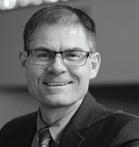
WHAT’S THE MOST IMPORTANT ISSUE IN THE UPCOMING U.S. PRESIDENTIAL ELECTION?
Carefully vet candidates’ and their party’s platforms. Identify what they’ve said and done for all citizens regarding religious liberty. Discover their views on freedom of speech, freedom from having to promote issues and/or behaviors that are against conscience, freedom of assembly, etc. Prayerfully consider your findings in light of biblical principle. Then vote accordingly, that we might stave off the coming darkness as long as possible.
* That’s a mouthful, isn’t it? More on this in a future article. In the meantime, googling terms such as natural law, Thomas Aquinas, John Locke, deism, and related topics may prove fruitful.
Shane Anderson is the lead pastor of Pioneer Memorial church on the campus of Andrews University in Berrien Springs, Michigan.

A case for analog Bible reading by a digital native.
Iam a member of the millennial generation. Since childhood we have grown up close to computers and the revolutionary technologies of the past four decades. This is why the handling and navigation thereof may come more intuitively to us compared to some who were introduced to it at a later stage in life. Millennials, as well as the following generations (Gen Z and Gen Alpha), are what many call “digital natives.”
Interestingly, during the past 15 years there has been a shift
within the user experience of personal technology from a more systematic, logical approach to what one could describe as a “magical methodology.” Despite apps and operating systems having become more advanced and sophisticated, engaging with these highly complex programs has actually become easier and much more intuitive and, in turn, increasingly addictive. Just watch with what ease even a toddler can navigate phones and tablets. Software engineers are integrating knowledge of how our brains

The Bible holds a competitionless space when it is unfolded in your hands.
thousands of fully searchable resources, original languages, commentaries, dictionaries, theological books, and articles. I hold in my hand more information than any physical theological library ever could. It is truly amazing and conducive for digging deeper into Scripture, asking theological questions, and researching texts in their original biblical languages and contexts. Theologians and pastors can attest that these tools are crucial, helpful, practical, and powerful for ministry, research, and teaching purposes.
With the ongoing explosion of AI-enhanced and powered software, we have entered an era in which the already-fantastic Bible programs’ research abilities are being transformed into an even more personalized experience. Through chatting with these AI-based programs, which have been fed all the above-mentioned content and more, you are able to “talk to the Bible” or “talk to a Bible character” and have research experiences that feel more like studying with a highly knowledgeable teacher and friend, in which the conversation goes back and forth. The AI learns your thoughts and personal context and refines its answers and content to the needs it detects throughout the conversation. It will be able to give you not only clear answers but also practical application pointers and directions that apply specifically to what the AI knows about your life and circumstances.
and psyche work into their programming. Consequently, they design their algorithms and codes in a way that our minds get hacked into a dopamine-filled, fun-oriented experience that flows smoothly and is just easy. We have now reached a point where advanced AI-powered apps and operating systems can even sense and foresee your needs and desires and cater their content and services accordingly. It’s incredible!
Thankfully, Christian software developers exist too, which means a wide variety of spiritual and Bible-related apps, websites, and technologies are available and being developed. As I write these words, I have access to hundreds of Bible translations through Bible websites and my personal Bible software. These offer me access to tens of
Seventh-day Adventists have been called and have paraded ourselves as “people of the Book.” We have our roots in the deepest type of Bible study and will always put great significance on the individual, personal exploration of Scripture. We open our Bibles (ideally) for Sabbath School, for the sermon, for small groups, for family worship, and, most important, for our personal devotions. We love our Bibles! We have themed Bibles, such as the Pathfinder Bible, Evangelism Bible, Archaeology Bible, Elders’ Bible, Ministers’ Bible, the Bible combined with The Seventh-day Adventist Hymnal, and so on.
I will never forget the time, when I was about 6 years old, that my local Pathfinder director visited
my home and handed me my first very own Bible. It was a German Martin Luther Bible with a green hardcover. I treasured it! I remember carrying it to my public school to read during breaks. I even tried to “brag” with it before my secular classmates. Just from a visual standpoint alone, there is something special about a printed, leather-bound, thousandpage-thick, gold-edged Bible that does not compare to any other printed book out there. Yet the trend to digital is an undeniable reality.
So will contemporary and future technologies be able to provide the same blessing as, or a lesser or greater blessing than, an old-fashioned Bible study, in which one uses a physical Bible, maybe some colored pencils, and occasionally a concordance?
I am not here to tell you what to do or how to do it. Technological advances have always impacted human beings and how things are done. With each emerging technological revolution, there will always be a group of people set in their ways of the past, disliking and rejecting the new thing without even considering its potential. Others embrace the change, and for some, the youngest among us, the new technology will be the only one they know. It would be a mistake to dismiss any new technology just because we feel overwhelmed or our comfort level with the “outdated” technology discourages us from trying something new. Let’s not forget that even the machine-printed page was at one point considered new, cutting-edge, modern-day technology. Perhaps there were as many naysayers in the days of Gutenberg as in the days of Zuckerberg. As long as the output is biblically sound, engagement with spiritual content and the Bible through new technology should not be dismissed.
But back to the question: Is there an advantage to a more analog approach to Bible reading and study? Or are words on a screen and words on paper equal?
If you are an avid reader, you probably already know the answer, even if it’s just a gut feeling. The research is clear: the printed page outshines the digital read in almost every way. Reading from a physical book has proved far superior regarding focus, retention, comprehension, and immersion in the written content. The simple act of holding a book, feeling its weight, and the handling of it in three-dimensional space contributes positively
to the brain’s absorption of information. The almost subconscious act of turning a page “creates an ‘index’ in the brain, mapping what we read visually to a particular page.”1 I am sure you have experienced this before, when you may not remember the exact scripture but do remember where on a page it was located.
The most obvious benefit to reading from a physical book, of course, is the lack of distractions versus a tablet or an e-reader, with its intruding vibrations, notifications, sounds, and easily accessible dopamine kicks. Sure, you can temporarily silence them, but your subconscious knows that the plethora of exciting apps is there, running in the background of your device and therefore occupying some anticipatory space in the back of your mind, simply by existing. We are told:
“We must turn away from a thousand topics that invite attention. There are matters that consume time and arouse inquiry, but end in nothing. The highest interests demand the close attention and energy that are so often given to comparatively insignificant things.”2
“Get wisdom! Get understanding! Do not forget, nor turn away from the words of my mouth. Do not forsake her, and she will preserve you; love her, and she will keep you. Wisdom is the principal thing; therefore get wisdom. And in all your getting, get understanding” (Prov. 4:5-7).
“Your word I have hidden in my heart, that I might not sin against You” (Ps. 119:11).
Let’s be clear: The Word of God is transformative, instructive, and powerful, whether you read it on paper or on a sheet of lit-up glass. The Holy Spirit can utilize any communication device, digital and analog. But when it comes to the daily choices we can make to enhance and improve our Bible-reading experience, we should be diligent in doing our best to improve the effectiveness of the Word in our minds and lives.
Is it possible to ride a bike with a dry, unlubricated chain? Yes. But will the ride go as well as it would on a well-oiled bicycle? Not for too long. Wear and tear will increase, damaging other components. Your ride will get noisy, and it will require greater effort.
Science and experience tell us that printed books make information retention and compre-

hension more likely. Applying this to Bible reading gives our already-overstimulated brains an advantage in exploring God’s character through His Word. Every little bit counts.
Can you get by and have a blessed experience in the digital Bible reading experience? Certainly! What on the surface may seem like an insignificant difference, however, such as using your physical Bible instead of a digital one, is, in fact, a significant one. Over time this choice will make a more substantial spiritual impact on your life. “We should improve every opportunity of placing ourselves in the channel of blessing.”3 Every small or big change we can make to improve the quality of how God’s Word is absorbed is worth it. We should make an effort to, at the least, spend the most valuable times of our Bible reading—our personal devotions—in a physical Bible.
Yes, it’s convenient just to pull out our phones and tablets to read the Bible. And engaging with an AI-powered Bible study tool is worth a try and can be part of our journey. The “magic feel” of today’s and future technology is undeniable and is certainly spilling over into digital Bible apps. Yet there is something more powerful, in my opinion, and that is the psychological effect of holding God’s printed Word in your hand. In the digital world of our devices, everything occupies a more or less equal space, with apps all having the same-size home screen icons and the same amount of power to notify you or get your attention. Yes, adjustments can be made in that realm, but they are limited, and a Bible app will always have to share its space with hundreds of other apps. Reading
We should be diligent in doing our best to improve the effectiveness of the Word in our minds and lives.
from a printed Bible, on the other hand, besides all the above-mentioned benefits, communicates to yourself and to others that you are prioritizing the content before you above all else, because there is nothing else. The Bible holds a competition-less space when it is unfolded in your hands. Holding God’s physical Word in your physical hand creates for you a deeper awareness of its value, importance, and holiness. It turns into a treasure, for the longer you use it, mark it up, and make it your own, the more unique and set apart it becomes.
There is a funny meme floating around the Internet that says something along the lines of “Moses downloaded from the cloud onto his tablet long before it was cool.” Of course, it’s just a joke, because the reality is that God gave him physical stone tablets onto which He had written with His own hand. God knows the importance of physical representations of holy information, whether on tablets or memorial stones, in books, or through the most magnificent physical representation of Himself to humanity—Jesus. Knowing the human mind the best, I believe He was onto something! Whatever your preferred method and means of engaging with the Bible may be, it is my prayer that, as people of the Book living in a world of increased digitization, we don’t forget the unmatched value, blessing, and advantage of holding, opening, and, most important, reading our printed Bibles.
1 https://www.psychologytoday.com/us/blog/well-read/202402/ the-case-for-paper-books-vs-e-readers
2 Ellen G. White, The Ministry of Healing (Mountain View, Calif.: Pacific Press Pub. Assn., 1905), p. 456.
3 Ellen G. White, The Faith I Live By (Washington, D.C.: Review and Herald Pub. Assn., 1958), p. 334.
Jonathan Walter is an assistant editor for Adventist Review.

Passive consumer or engaged Bible student?
Are physical Bibles still relevant in the digital age? To answer this question, it is helpful to consider technology’s progress and impact on society. In the Bible, the term book appears much more frequently than the term scroll, yet the transition from scrolls to books occurred only after the Bible was written. Translators chose the word “book” because scrolls are increasingly foreign. With the rise of computers, books began transitioning to digital formats, where one could read entire encyclopedias from a CD on a computer. The Internet and ever-improving smartphones now place extensive libraries in our pockets. Thanks to such advances, the Bible is more accessible than ever. But do more people read it?

Between 2011 and 2021 only 50 percent of adults in the United States used the Bible, with the lowest average in 2020, right when COVID-19 was most active. Here, “use” was defined as reading, listening to, or praying with a Bible at least three to four times a year. If we count just those engaging with their Bible weekly, the percentage drops to 34 percent as of 2021. 1 In a context characterized by constant news reports of death tolls, lockdowns, virus mutations, and fear for the future, one might have expected Bible engagement to increase. But it did not—at least not in the United States. Why?
Today’s digital world offers access to much more than just the Bible. YouTube, podcasts, and other streaming services have replaced such traditional media as radio and cable TV. These platforms even allow us to consume content at two or three times the regular speed. Digital books often have audio options for added convenience and time saving. Social media platforms serve as a way to connect with others, where people select highlights of their lives to share with friends and acquaintances. Entire college courses are available free of charge from Ivy League universities. Even in-person shopping has been replaced with next-day delivery or preordered grocery pickup.
Despite these conveniences, Bible study isn’t on the rise, and human connection, education, and overall life satisfaction often stagnate. While technology makes everything more accessible, it also fuels consumerism and adds complexity and noise to our lives, squeezing more activities into the same 24-hour day. One study found that Americans check their phones an average of 144 times a day, spending a daily average of 4 hours and 25 minutes on them.2 Many of us believe that our quality of life has improved because of technology’s benefits, but we must ask ourselves: Has this brought happiness and peace?
Genesis 1:27, 28 teaches us that when God created humanity in His image, He intended for humans to be fruitful, fill the earth, and have dominion. Common to these goals is an inherited creativity that God instilled within humanity, and this creativity comes naturally. When I was a child, I wanted to be an inventor. All I needed was a small notebook and pencil to start scribbling down my dream inventions. I filled the pages with such ideas as rocket-propelled Rollerblades, flying cars, jet packs, and more. Such creative toys as Lego, K-Nex, and Mechano helped spur creativity indoors, along with building forts and tree houses outdoors. As personal computers became available, digital exploration and discovery opened up a new world of possibilities. It also included tension, however. On the one hand, creativity was propelled by learning about computers, exploring graphic design, web design, the Internet, and cybersecurity. On the other hand, gaming and entertainment vied for time and attention.
In my experience the balance between creativity and consumerism significantly impacts success and how people experience life and Christianity. In the social media world, while anyone can become a “creative” and contribute to the consumer-driven popularity of vlogging and reels, most people spend a disproportionately high amount of time as consumers. Only watching and imagining comes at an opportunity cost in which our creativity is diminished. After all, watching others live out their dreams and living like them in our imagination is easier than actively creating change in our own lives. And even if we do change, a consumer mentality is primarily self-focused, whereas God’s intent for creation is ideally about self-giving. One of the primary consequences of a consumer-centric life is that attention spans go down, thinking is limited to what is observed, and memory is impacted. Nobody can be expected
Knowing God is not just about consuming and knowing facts; it’s about regularly interacting with Him and experiencing His presence.
to remember hundreds of short clips and updates viewed in rapid succession.
A consumer-centric approach to life has a devastating impact. Most media formats direct and retain our attention by changing shots and content every few seconds. How can we expect the Bible to compete with that when it requires prolonged focus and attention?
A distinction needs to be made here. Engaging with Christianity and the Bible should not be approached with an imaginative consumer mentality. Christianity cannot be experienced vicariously. Christianity is primarily relational, and all relationships require creativity and self-giving to thrive. Similarly, Bible study focused on surface-level content consumption will be unfulfilling compared to what the world offers. Why? Because the Bible is not designed simply to entertain us, but to creatively engage with our hearts, minds, and who we are—transforming us from within. This requires an active kind of engagement as the Holy Spirit dynamically guides us, not just passive reading. It involves asking questions to understand the original intent and meaning, connecting the overarching principles with our present reality.
During the summer I took a school tour to Turkey, where we visited the locations of Revelation’s seven churches. Our Muslim tour guide showed us various statues, pagan temples, and basilicas, telling us their stories and history as he took us from location to location. We learned many interesting facts and connections between these places and history. Fortunately, he also gave us free time at each location, so we incorporated another approach. We decided to explore and focus on Christian details in the broader context of each city. When we observed the details of these sites more closely, we discovered churches and shops where Christian symbols were found. This deeper, more focused approach helped give us better insights into the presence of Christians and how they might have lived within the larger context of each city. As valuable as our tour guide was to give us the facts

and details he knew, this did not equip us with the skills to explore and learn independently. Returning without a guide, we might have felt lost or overwhelmed, relying on the details we remembered from the tour. A deeper, more focused study that taught us what to look for, observe, and analyze would have enabled us to appreciate it independently, discovering and gaining new insights.
Many sermons, Sabbath School lessons, and Bible study guides follow a broad topical format. Speakers and authors carefully weave together numerous stories and narratives based on a preselected topic. As a result, much of the communication includes common ideas and themes they already had in mind from the outset. While this has its place, limiting oneself to these tools can result in a superficial engagement with the biblical text, limiting growth in understanding if used exclusively.
Such approaches rarely demonstrate how to thoroughly study and understand a single passage within its own context. When the average person opens their Bible at home, their sense of discovery may rely more on finding beliefs and connections they already know, rather than on discovering new insights and applications within a single passage. Understandably, many find Bible “study” like this boring. This doesn’t mean connections between different passages should not be made, as these can be tremendously valuable. There is immense value, however, in understanding a passage’s immediate context and meaning in context before connecting it with other passages and their meaning.
So how can we shift from being passive consumers of the Bible to actively engaging with it in the digital age? First, there is much benefit in disconnecting from technology and engaging with a physical Bible. This is especially important if you become distracted when notifications catch your attention. Physical Bibles provide a multisensory experience, allowing us to engage with touch and visual cues, which aid in memory retention. This makes it easier
Scan the QR code with your smartphone to try an AI app (GPT) for Bible Study.

to locate specific chapters and verses on a page. Taking a few minutes each day to disconnect from the digital world can also help improve our ability to focus, which is beneficial in other aspects of life. This is a great starting point for those who don’t have other opportunities for quiet, undistracted focus.
To benefit from digital Bible study technology better, there are a few helpful strategies and resources:
1. Utilize the focus mode available on most Apple and Android devices to limit notifications and distractions when you study.
2. Try such apps and websites as Logos,3 Accordance,4 Blue Letter Bible,5 Step Bible,6 and EGW Writings7 to access a wide range of Bible resources and Ellen G. White’s writings.
3. Audio Bibles such as Bible.is8 and Dwell9 allow you to engage sight and hearing by reading along as you listen. This can help those who struggle with focus.
4. Digital resources make it easier to use concordances accurately. Concordances help us look up words to see the range of possible meanings associated with a Hebrew or Greek word in the Bible. Taking any or all definitions for a word found in a concordance and plugging them into a particular verse where the Hebrew or Greek word occurs risks a fallacy known as illegitimate totality transfer. Always consider the literary context and grammar to determine the best meaning for a word in a particular context. For example, the pronoun “it” in Exodus 20:8, “Remember the Sabbath day, to keep it holy,” cannot be substituted with “yourself,” even though the concordance lists this as an option. The grammar requires the pronoun to agree with its antecedent, “Sabbath.” Marble.Bible10 is a valuable tool to make this easier by showing the semantic domain of words and the various ways they can be used. It provides a more accurate approach to understanding which word definitions may fit a specific Biblical context.
5. Using artificial intelligence is a controversial topic when it comes to Bible study. Many solutions
here focus on a consumer-oriented approach, using AI to create devotionals or help find texts that align with the user’s beliefs. The issue here is that the AI can produce hallucinations or regurgitate popular errors from its training data. It is also possible, however, for a thoughtfully designed AI app (GPT) to assist you in following a series of simple Bible study steps creatively, prompting you to ask yourself questions to draw your own conclusions rather than simply providing answers. I experimented with creating a GPT specifically for this purpose, and it is freely available to try using the QR code on this page.
In the digital age, being “people of the Book” is not just about the type of format we use (scrolls, books, or ebooks). Being “people of the Book” is about having a genuine and consistent connection with God and His Word. Knowing God is not just about consuming and knowing facts; it’s about regularly interacting with Him and experiencing His presence. This involves listening to Him through His Word, communicating through prayer, and allowing Him to transform us daily. To be “people of the Book” in the digital age, one must consistently experience this creative relationship. How does your practice reflect your priorities here?
1 https://www.barna.com/research/sotb-2021/
2 https://www.pcmag.com/news/ americans-check-their-phones-an-alarming-number-of-times-per-day
3 “Get Started With Logos,” Faithlife, 2024, https://www.logos.com/ get-started.
4 “Download Accordance,” Oaktree Software, 2024, https://www. accordancebible.com/download-accordance/.
5 “Bible Search and Study Tools,” Blue Letter Bible, 2024, https://www. blueletterbible.org/.
6 “Step Bible: Scripture Tools for Every Person,” Cambridge, 2024, https://www.stepbible.org/.
7 “Ellen G. White Estate: Egw Writings Apps,” Ellen G. White Estate, 2024, https://whiteestate.org/resources/apps/.
8 Bible.Is, “Faith Comes by Hearing,” Faith Comes by Hearing, 2024, https://www.faithcomesbyhearing.com/audio-bible-resources/bible-is.
9 Dwell, “Audio Bible App,” Dwell App, 2024, https://dwellapp.io/.
10 “Marble: Modular Aggregation of Resources on the Bible,” United Bible Societies, 2024, https://marble.bible/.
Eric Louw is a Ph.D. student at the Seventh-day Adventist Theological Seminary, Andrews University, Berrien Springs, Michigan.

Embracing God’s call and discovering a heart for service
Isaw a malnourished baby yesterday. He wore only a tattered shirt, so I could see how skinny his little legs were. He looked about 10 months old, but the size of his head told me he was probably a lot older. He was crying, and the look in his eyes seemed so desperate. He was being held by a boy who looked about 6 or 7 years old; there was no parent in sight. And my heart broke.
I am living in a place where daily I see things or hear stories that remind me how thousands of years of sin has reaped unfathomable sorrow. And in this place the sorrow seems almost hopelessly irreversible.
Today the hospital chaplain texted me pictures asking me to pray for a baby who has burns over at least 50 percent of their body. There is no electricity or running water here, so burns are a frequent occurrence, as everyone cooks over open fires. My husband has treated multiple people with burns down to the bone. He also sees dental abscesses that track below the rib cage; a flesh-eating fungus so serious that it has reached the brain; huge, advanced cancer growths; bone fractures from months before that didn’t receive the proper prompt attention and care; botched circumcisions; gross deformities and malformations in babies; dire malaria cases; numerous lung infections; and the list could continue.
This is the place to which God called us. It was in 2023 that God stirred our hearts and turned our lives about-face toward mission work. That year He sold our house for us, gave my husband a willing heart to walk away from a successful
surgical practice at the peak of his career, and moved us eight time zones away.
We have been living at our mission post for seven months now. Daily we are exposed to the sad sights and stories that weigh heavily on our hearts. Stories of hunger, debt, betrayal, death, fear, and superstition. The need overwhelms us as we try to figure out where to begin or prioritize how best to help. Yet being here has better helped us appreciate the immense burden on Jesus’ heart as He hung upon the cross carrying the sins of the entire world. Now I have a better understanding of the painful heaviness that crushed His heart with sorrow. Jesus also knew what those sins would cause— exponential grief and pain through the ages to come. Praise God He endured.

THE NEED OVERWHELMS US AS WE TRY TO PRIORITIZE HOW BEST TO HELP.
Andrew Murray once wrote, “O teach us to love [the cross] not only because on it Thou didst bear our curse, but because of it we enter into the closest fellowship with Thyself.”
Serving as missionaries is enlarging our hearts to a deeper appreciation for forgiveness, a greater reliance on Christ, and an expansion of love we have not known before. In this place, with Jesus’ help, we are learning to endure.
That love that raised Jesus as victorious is the same love that directed us here, to a place I might otherwise describe as God-forsaken. That love, through the heaviness and heartache, more fully reveals the heart of God to us. And that love offers peace and privilege to work hand in hand to bring hope and healing to the hopeless.
Katie Waterbrook is serving with her family as a missionary nurse and mom to three.
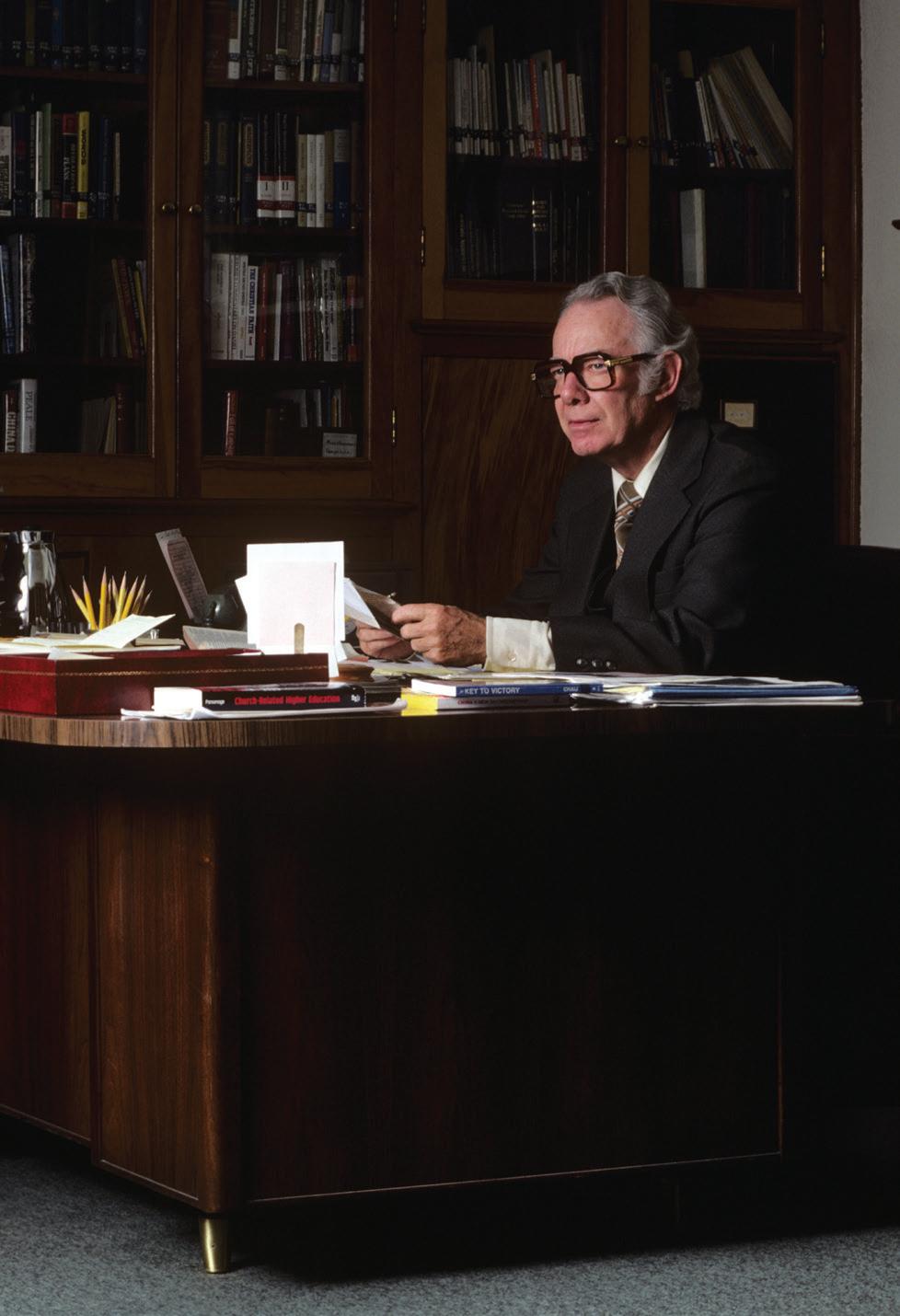
A decade of controversies impacts the church.
When Kenneth Wood was appointed editor after the sudden death of F. D. Nichol, things in the office continued as usual. Wood embraced his editorship, making changes slowly as he became more settled into the job.
There were the usual changes that had happened in years past. The number of pages decreased from 32 to 24 as a cost-saving measure. There was experimentation with paper, with one reader noting the paper seemed duller than usual. Wood’s response to the sharp-eyed reader was that, indeed, they were looking for a whiter coated stock and experimenting with what worked best.
Wood added a column featuring older Adventists. When flooded with photos and biographies, editors limited it to only centenarians. This reflected a longtime goal of the Review that Wood continued to support—“to hold our senior citizens while at the same time adding thousands and thousands of younger families who each year join the church.”1
Letters to the editor remained a prominent feature, serving not only as a forum for members but helping to make them feel connected. “Sometimes we tend to think like Elijah: ‘I, even I only, am left .’ ” one reader wrote. “But in reading the letters from our fellow believers, we realize that God still has His thousands who have not bowed the knee to Baal and that others are also concerned about problems within the church and have the desire and determination to be ready when Jesus comes.”2
Stanborough Press in England merged with the Review and Herald Publishing Association (RHPA), prompting the idea to create a monthly world Review for countries with primarily English-speaking populations. Started in 1971, this new publication was edited by the Review editors but printed in England.3
The Review was used in other creative ways as well. In 1974 Robert H. Pierson, General Conference (GC) president, made an appeal for financial donations to build churches in southern India.4 The response was overwhelming, as demonstrated by a headline on the back page several weeks later in large bold type: “Don’t Send Any More, Thanks!” More than $200,000 was received in less than 50 days.5
A “Friendship Issue” to share with neighbors and non-Adventist friends was published in 1971 and again in 1978. A “Gift Issue,” with similar intent, was published in 1979. Intended as a Christmas gift, it had a specially commissioned
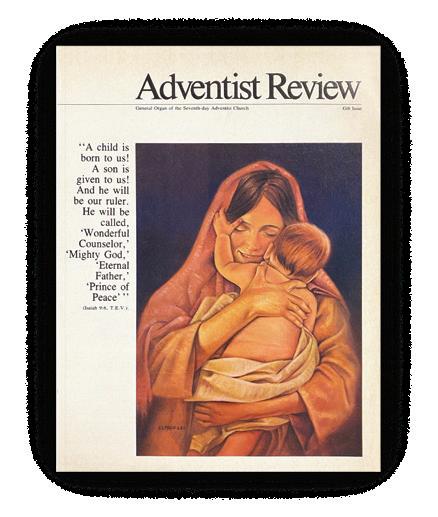
cover by artist Elfred Lee of Mary with the infant Jesus. The entire issue was Christmas-themed, although published in October so subscribers could order more in advance of the upcoming holiday.6
A bigger change came in 1978. At a meeting of the World Council of Churches Kenneth Wood was given a name tag with his affiliation: Review and Herald. This apparently confused attendees thinking he represented two publications: the Review and the Herald. He then discovered that the Review in South America was titled Revista Adventista; in French, it was Revue Adventiste—in both cases, translated as Adventist Review. It made sense to Wood as well as to the board to change the name to Adventist Review, which it has remained to this day.7
As the Adventist Church entered the 1970s, church growth shifted the membership away from its North American roots. While the North American membership still carried most of the financial support (69 percent), they represented only 20 percent of the membership in 1978.8 American culture reflected a restless society that increasingly challenged authority, called for social justice and equal rights, and demonstrated individuality through self-expression. Some of these trends began to find expression in the church.
One response to the changing youth culture was to replace the Youth’s Instructor, the venerable
118-year-old Adventist publication, with Insight magazine, with young editors who will “tell it like it is and also as it should be!” When the new publication first arrived in Sabbath Schools with its modern layout and edgy topics, it surprised traditional Adventists.9
The Review, however, continued its black-andwhite look, with some exceptions. While color had appeared occasionally, it was primarily advertising that showed the biggest difference. With the innovation of meat substitutes as a protein source, health food ads in color began to appear. Ads showed happy Adventist families dining on their “meat-flavored” food with descriptions of “smoked beef,” “fried chicken,” and “smoked turkey.” This terminology jarred many subscribers. Letters of complaint began to arrive in the editor’s office commenting on the food names, wording in the ads—one even expressing that a woman pictured wore too much lipstick. Editor Wood showed his sense of humor when he replied that perhaps she’d eaten her vegemeat with too much catsup.10 The editor offered to look at wording, but otherwise was not moved to make any changes. The advertising sales helped to fund occasional color covers, and the editor felt this benefit outweighed the previous policy of ads promoting only book sales. He did, however, receive a letter from GC president Pierson, who must have experienced one too many members commenting on the advertising. Pierson’s suggestion? Wood might put something in the Review asking members not to read the ads on Sabbath.11
Insight wasn’t the only magazine exploring hot topics. A subtle but important decision occurred that initially didn’t seem related to Review history. More young Adventists were opting to attend non-Adventist university graduate programs. Several met with church leaders about establishing an Adventist Student Association on a national level to allow for fellowship and to exchange academic thoughts and opinions from a Christian viewpoint. An exploratory committee chaired by Neal C. Wilson, then vice president of the North American Division, agreed to the creation of the Association of Adventist Forums.12 In 1969 the Association of Adventist Forums began publishing a quarterly journal, Spectrum. Though it may not have seemed significant at the time, it was for many members the first time they could read an alternate source of information about the church. The publication
was independent and apart from the church, with freedom to publish viewpoints that may or may not have agreed with church leadership or mainstream Adventism. This development eventually resulted in more expressions of nonstandard perspectives than church leaders had imagined when they initially gave their blessing to the creation of the Association of Adventist Forums. Spectrum offered highly different, often critical views of church leaders and initiatives while the Review continued to speak authoritatively for the church.
The late 1970s continued to pose challenges not only to church leaders but to the Review editor as well. The tension is palpable in editorial correspondence. Hot topics included: Black unions (the recommendation to place Black regional conferences under their own union structure); equal rights for women; the Adventist medical work (particularly as it related to building big business and the change from the denominational wage scale to a more competitive one); and a number of theological controversies, including righteousness by faith, Ellen G. White and her writings, the sanctuary, and the investigative judgment. Readers began sending their concerns and inquiries to the Review editor. One close friend sent a letter her pastor had circulated around her local church. After detailing to her what he believed was at the center of much of the debate, Wood wrote, “The people who hold the same views as does your pastor consider that the Review is the spokesman for the opposite point of view.” He went on to write, “I want to keep my profile as low as possible in the present controversy.”13 This was not because he felt cowardly, uncommitted, or unable to respond to the debate, but because of the volley of opinions ranging from thoughtful to critical.
Wood reassured another member: “It confirms the impression that we have here, that is, that many of our people in the field would be somewhat discouraged were it not for the fact that the Review continues to adhere to well-established Adventist doctrine. By God’s grace we shall not be moved. . . . Please pray that we may have the wisdom we need in these bewildering, challenging times.”14
Letters to the editor had been up until this point answered directly by Wood himself. But more and more letters were now being answered by Eugene
“With so many voices attacking our historical beliefs, the Review has taken upon itself the task of contending for the faith once delivered to the saints.”
Durand, assistant to the editor, or his administrative assistant, Corinne Russ. Yet while they did the formatting, the core response was still from Wood. He read every letter and wrote responses in the margin. One response read like this: “We would like to plead innocent to the charge of toning down the message of the Seventh-day Adventist Church, for we feel that we are among the most faithful in the church in upholding this message. With so many voices attacking our historical beliefs, the Review has taken upon itself the task of contending for the faith once delivered to the saints.”15
One member had ongoing correspondence with Wood, with each letter increasing her disapproval of how the editor was handling the recent debate. She eventually wrote that she and her husband were canceling their subscription. “It is a black mystery why the hierarchy of the church opposes [names] and others who are giving the Good News of what Jesus did for us on the cross.” Wood’s responses were kind and direct and done personally. “The Review staff does not take its responsibilities lightly. It tries to be faithful to the Advent message and to be sensitive to the leadings of the Holy Spirit. It examines carefully every teaching that is being presented by various people throughout the church and is open to ‘new light.’ Our prayers are united with yours that the Review may continue to be the kind of blessing to the church that it has been throughout its 128-year history.”16
By July 1978 one can sense Wood growing weary as well as somewhat wary. In a long letter to GC president Pierson prior to yet another conference on the righteousness by faith issue, Kenneth Wood wrote of his deep concern over the current controversy. He requested that Pierson think about recording the upcoming conference to quell the false reports that would typically circulate afterward. Pierson responded: “I know the heavy burden that you carry and the concern that is yours, and I want to assure you that I carry a similar burden on my heart. I am anxious to have the Lord have His way in this discussion, and I believe that He is going to help us out.”17
1979 Review staff: (top) Jack J. Blanco, Pat Alden; (left to right) Aileen Andres Sox, Eugene Durand, Don F. Neufeld, Jocelyn Fay, Chitra Barnabas, JoAnne Shockey; (front) Corinne Russ, Kenneth H. Wood. ADVENTIST REVIEW
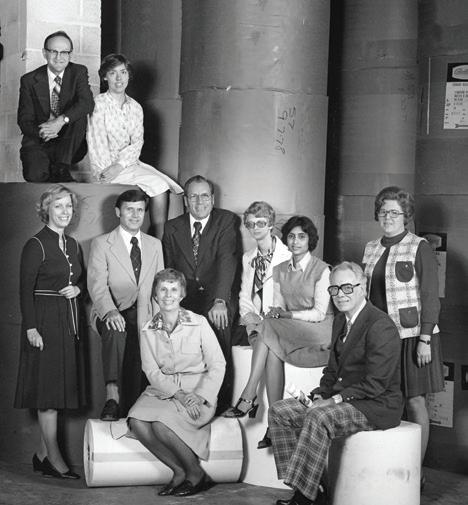
Wood continued to maintain a high editorial standard. “The Review cannot stop publishing our special truths just because someone is challenging them,” he said in an interview with Insight. “In times of controversy we don’t give away the field and let people think that the church has no answer. The Review has a responsibility as the general church paper to provide our people with the kind of material they really need.”18 Later in his retirement he reported no regret. “I felt we were in a fierce battle between truth and error.” “I considered we were under siege, as it were—we were sort of keeping our finger in the dike, a defender of the faith. But I believe the church came through that period stronger than it was before.”19
1 To Ernest Lloyd, June 30, 1967.
2 From Mrs. Joe D. Griffin, Review and Herald, Dec. 24, 1970, p. 13.
3 Review and Herald, Nov. 26, 1970, p. 23.
4 Review and Herald, Jan. 9, 1975, p. 2.
5 Review and Herald, Mar. 20, 1975, p. 24.
6 Adventist Review, Sept. 13, 1979; Oct. 18, 1979.
7 Adventist Review, Jan. 5, 1978.
8 116th Statistical Report, General Conference of Seventh-day Adventists, 1978, pp. 2, 3.
9 Review and Herald, May 14, 1970, pp. 31, 32.
10 Kenneth H. Wood to Mrs. F. E. Ingle, May 19, 1967.
11 Robert H. Pierson to Kenneth H. Wood, Feb. 6, 1967.
12 Review and Herald, Jan. 11, 1968, p. 21.
13 Kenneth H. Wood to Hazel Hines, Nov. 7, 1977.
14 Kenneth H. Wood to Mable H. Towery, Dec. 19, 1977.
15 Eugene Durand to Clarence T. Gegan, Mar. 15, 1978.
16 Kenneth H. Wood to Mr. and Mrs. Richard S. Paulson, Nov. 30, 1978.
17 R. H. Pierson to K. H. Wood, Aug. 3, 1978.
18 “Interview With Kenneth H. Wood,” Insight, June 9, 1981, p. 5.
19 Sandra Blackmer, “The Life and Times of Kenneth H. Wood,” Adventist Review, Jan. 24, 2008, p. 8.
Merle Poirier is the operations manager for Adventist Review.

While we wait for God to answer, we can look up through the night and see the tears in His eyes.
This month features excerpts from an article in the June 25, 1981, issue of the Adventist Review, in which L. Jean Sheldon wrestles with the apparent silence of God and how we can have confidence in God’s love even in the midst of the storms of life.
othing is more frustrating than to talk to someone who never responds. 1 Silence from God is even harder to accept. . . . Silence is usually an indication of an I-don’t-care attitude, and certainly God cares.
Yet there are times when God seems silent. Maybe it is at night when you lie in bed looking up into the darkness, struggling to hear something, anything, and all you get is silence. . . . Perhaps you have just received word that someone very close to you has died, and the only response to your prayerful questions is silence.
At such a time it’s tempting to say to God, “Why don’t You answer? Don’t You care?”
But God is not an uncaring Being who lets our prayers get shoved into the third file drawer. . . . He may be silent, but never without a reason.
Why does God sometimes appear to be silent? The answers are many.
1. We need to listen to God. The problem may be that we are not listening, not that God is silent. We may be screaming so loudly at heaven that we have overloaded the communication lines. . . . Through silence He may be inviting us to listen.
Silence may also be God’s way of showing us sins we have hidden even from ourselves. “Behold, the Lord’s hand is not shortened that it cannot save,” wrote Isaiah, “or his ear dull, that it cannot hear; but your iniquities have made a separation between you and your God, and your sins have hid his face from you so that he does not hear” (Isa. 59:1, 2, R.S.V.).2
Perhaps we have left His side to walk alone. God will not force
Himself on us if we choose not to keep up our relationship with Him. Often He patiently, silently, waits until we discover our separation from Him.
2. Silence strengthens our faith. Job, a man struck by terrible tragedy, discovered this. Often he felt God’s silence so intensely that it seemed to him that God was unconcerned. “I cry to thee,” he prayed, “and thou dost not answer me; I stand, and thou dost not heed me” (Job 30:20, R.S.V.).
But later, when Job’s faith had been tested fully, God answered him with a revelation of Himself. The silence, though nearly unbearable, had strengthened Job’s faith.
Faith, like taffy, must be stretched in order for it to harden. One of the best faith stretchers is silence. It is in silence that we strain to hear more clearly God’s compassionate voice, His gentle whispers of peace. Silence also gives us opportunity to think about God and review the evidence that He is trustworthy. . . .
3. God is in control. . . . Silence may be evidence that there is no need for God to speak. The situation is in His hands. Even though life may seem to have reached disaster drop-off, all is well with God. Habakkuk had to learn this lesson of silence. “O Lord,” he cried, “how long shall I cry for help, and thou wilt not hear!” (Hab. 1:2, R.S.V.). The answer? “The Lord is in his holy temple; let all the earth keep silence before him” (chap. 2:20, R.S.V.). Or, as a friend of mine put it, “Hush up, Earth! All is well with heaven!”
Later Habakkuk was able to say, Even if everything disappears and there is nothing to eat, “yet I will rejoice in the Lord” (chap. 3:18, R. S. V.).
4. We would misunderstand. Just before His death Jesus was faced with the dilemma of how much to tell His disciples about His sufferings on the cross. He had much to tell them, He said, but they could not endure it yet.
Sometimes God would like to show us what is really happening or why events occur, but if He did we would not comprehend His purpose. In order to keep us from misunderstanding Him or even rejecting Him, He has to wait for us until we are ready and can understand. In some cases we may not understand until we reach heaven.
Like an artist, God cannot paint the entire picture of our lives at once. Sometimes He must shade
God suffers with us when we suffer and He is silent.
in a darker part, one that looks ugly and perplexing. But later He may splash His brush across the darkness with gold to let it radiate His glory.
5. Silence indicates that God suffers too. Sometimes there is a reason for silence beyond God’s personal will.
As in the story of Job, Satan may be saying to God, “You’ve got to let me see whether he really thinks You’re worth his trust when everything goes wrong.” So God waits, all the while suffering with the individual.
How His Father’s heart must have been wrung in anguish when, in the silent darkness of Calvary, Jesus cried, “My God, my God, why hast thou forsaken me?” (Matt. 27:46, R.S.V.). How He must have longed to say something comforting to His own Son!
But Jesus’ faith that His Father’s silence was not a sign of unconcern should give us courage. God suffers with us when we suffer and He is silent. Even when He is silent because we are not listening, He is full of pity for us when we cry, “Oh, God, where are You now?”
He is never far away. Silence is His gracious way of giving us new opportunities to check out our lives to see whether they are connected to His. It is our chance to show those around us that we still trust Him, believing that He is in control and that someday we will understand.
And, while waiting for Him to answer, perhaps we can look up through the night into His face and see the tears in His eyes, knowing that He too suffers with us in silence.
1 L. Jean Sheldon, “When God Is Silent: While we wait for God to answer, we can look up through the night and see the tears in His eyes,” Adventist Review, June 25, 1981, pp. 4, 5.
2 Bible texts credited to R.S.V. are from the Revised Standard Version of the Bible, copyright © 1946, 1952, 1971, by the Division of Christian Education of the National Council of the Churches of Christ in the U.S.A. Used by permission.
L. Jean Sheldon has served as a professor of religion at Pacific Union College for nearly 30 years. She was a sophomore theology major at Andrews University when this article was originally published.

Rockets split the night air. Shrapnel pitted the ground around us, sending up little sprays of dirt. Jim, my partner on patrol, and I both dived into the nearest bunker. I had been through several attacks in Vietnam, each of which was frightening, but this time it was different. In only two weeks I would be going home to my family and to peace. We all feared we might get hit just before we were due to leave for home. We had seen men killed the day before they were to leave, and our fear had grown into a kind of superstition.
That night in the bunker I began really to think about God. I had received a letter from my wife a few days before in which she told me that she had been going to the Seventh-day Adventist church and had been praying for me. I was not a Christian, but I had some vague notion that there was a divine Creator. My wife had sent me Bible studies, which I had studied carefully.
Now I thought about my wife’s many prayers for me. “Jim,” I asked, “do you believe in God?”
“Yes, I do!” he replied. It helped to talk about our fear. We knew little about God, but both Jim and I were reaching out to Him. We prayed together as best we knew how.
When the all-clear signal sounded, we crawled out of the bunker and inspected the damage. It was a relief to get off duty and go back to the barracks, but I found it hard to sleep. I kept thinking about going home. I thought about God. I thought about my wife’s prayers, and
the belief grew in me that they were my protection.
The next few days were quiet. Then, the night before I was to leave the base, everything broke loose again. I was riding patrol with Jim, taking it easy and saying goodbye to some of the people who worked with me. We had just rounded a curve when the side of the jeep on which I was sitting was suddenly stitched with bullets from a submachine gun. It was an ambush. Jim and I leaped out and crouched behind the jeep, trying to see if we could tell where the gunfire had come from.
We waited 15 minutes, but nothing else happened. Cautiously we began to investigate, trying to determine where the enemy had been hiding. Finding nothing, we went back to the
jeep and began checking it over. On the passenger’s side the jeep was like a sieve.
Jim and I looked at each other in astonishment. “Can you explain why neither of us was hit?” I finally asked. “You told me a couple of weeks ago that your wife was praying for your safety. I suspect that the good Lord has answered her prayers. You should have been killed.” Back at the barracks I tried to get some rest. However, I kept wondering why God would save me. I was an alcoholic, smoked three packs of cigarettes a day, and was profane in the extreme. Of what possible use could I be to Him?
I awoke to a beautiful day. I was leaving for another base. My luggage packed; I was more than ready to go. I reached the terminal around twelvethirty, the time scheduled for my flight. Checking in with the man behind the counter, I said, “My flight is a C-130 departing at one o’clock. Is everything going as planned?”
“Sorry, bud, but your flight left about an hour ago,” he replied.
“Left! But it wasn’t due to leave for another half hour. How come?”
“No known reason,” he said matter-of-factly. About this time, I definitely lost my composure.
“Look, buddy, I’m supposed to leave this place today. I was supposed to be on that plane. I don’t care if I have to hijack a plane, I’m going to get out of here. I hope you and everyone else around here understand that.”
He glanced up from his paperwork and smiled. “Sure, I understand. Well, you’re in luck today, because we have another plane leaving in about an hour, and you’ll be able to go on that one.”
After waiting about 15 minutes, I saw a man hurry up to the desk with terrifying news. “That C-130 has just crashed in the high country!” he shouted to the clerk behind the desk.
“Any survivors?” asked the worried clerk.
“No survivors. Everyone on board was killed.”
I jumped up from my seat with my heart thumping in my chest. I ran up to the desk. “Was that the plane that left early, before its normal departure time?”
“Yes. Hey, buddy, you look pretty agitated.”
“I was supposed to be on that flight. I came early to catch it, but I still missed it,” I said.
I began to shake. I sat down and tried to calm myself. Another close call! I had believed in luck
I began to shake. I sat down and tried to calm myself. Another close call!
and chance before this, but now my thoughts turned to God. He must be saving me for something. But why me?
When it was time to board the plane, I had new worries. The enemy often tried to shoot down aircraft taking off and landing. When the pilots took off, they went as straight up as possible. When they landed, they swept right in without much of an approach. Still, many of them were hit.
But the plane was not shot at that day, and we arrived at the island where transient living quarters had been set up for people passing through. When we arrived, we discovered that there had been such an influx of personnel that day that the Army staff could not provide beds for us. But they had made arrangements to send us to the Navy compound on the other side of the island. There we were shown into a two-story barracks. I happened to get the first floor, a lucky circumstance in case of attack. After receiving my linen, I made my bed. Then I sat down for a leisurely talk with two soldiers who had come over with me. As we talked another soldier came in.
“Better watch it tonight,” he said. “There’s a rumor that we’re supposed to get hit again.”
It seemed that I just could not get away from this country peaceably. “This is the last piece of news I need, but I’m glad you told us. We can prepare for it and maybe we can help one another,” I said grimly.
We decided to stay as awake and alert as possible. We were sitting on our bunks around tenthirty that night when all of a sudden, the world seemed to explode. We jumped under our beds. Under one of the other beds a fellow was saying, “Hail, Mary, full of grace . . .” The rosary he was using sounded like a handful of marbles, he was so nervous. Another was asking God to help him. Then I heard myself saying, “Please, Lord, get me out of here safely.” I heard many kinds of prayers in that barracks that night.
When I walked into the church that Sabbath, I found it an experience more glorious than I could ever imagine.

I thought back to my experiences of the previous three days. I was sure God was intervening to save me, but all the familiar questions crowded through my mind—for what purpose? why me?
The all-clear signal jolted my thoughts back to the present. I was anxious to find out what damage had been done. I saw a medic going by and called to him. “Was anyone killed or wounded?”
“Four of the soldiers who were going back with you got wiped out on the other end of the barracks. That’s all we have been able to find.”
We went outside. A rocket had hit right below my window, but it was a dud. If it had exploded, everyone in the room would have been killed. I said, “Can you beat that! I’m so scared now that my insides feel like jelly.”
“Let’s get out of here before that thing goes off,” one of the soldiers said. “Here we are, close to going home and saved by a dud.”
“No!” I said. “I believe we were saved by God. Someone had to stop that thing from going off. It isn’t just luck that we have come this far and are still safe.” The plane that was to take me off the island and out of Vietnam departed at ten o’clock the next night. All of us on the plane shouted for joy. In our happiness, we even forgot about the enemy’s strategy of shooting at the takeoff. After a long flight, the plane finally landed. I was so excited that I stuttered to the stewardess as I prepared to deplane.
“Soldier, you really are excited about getting home, aren’t you!” she said.
“Sure am,” I replied, looking out of the windows of the plane, trying to locate my family. The door finally opened, and all of a sudden, I was going down the ramp. My knees were shaking. I saw my family on the other side of the fence. I ran as hard as I could, passing the guard. He didn’t even try to stop me. My family and I all had tears in our eyes. I grasped them all in my arms and squeezed. We seemed to stay like that for an eternity until finally someone tapped me on the shoulder and said, “You have to go back and clear customs, soldier. Sorry!”
I turned around. It was the guard. I went back and rushed through to get back to my family. I had not seen my wife and children for a whole year.
I arrived on a Friday. The next day was the day my wife went to church, and I was going with her. As we started for church that morning a strong certainty came over me. “You have joined this church, haven’t you?” I said. “Why didn’t you tell me?”
“I was afraid you’d get upset, and the last thing I wanted to do was upset you while you were over there. Oh, Gene, I’m so happy God has answered two of my prayers. One was that you would come back safely to me. The other was that you would come to church.”
When I walked into the church that Sabbath, I found it an experience more glorious than I could ever imagine. The people were loving and friendly, but the most important thing was that I was really home with God. I was at peace for the first time in my life. I understood now why God had saved me. He had plans for me. To walk into God’s house, filled with love, to know that He was guiding me step by step, brought me undreamed-of happiness.
I thank Him that He spared me. Now I belong to Him and want to live for Him.

is 80 and living with gratitude every day.
She had a friend tell her about ways to take advantage of new tax benefits so that she could help in a greater capacity. She is as excited as ever to help the youth program at her church continue to grow. But Carol still has questions.
To learn more about Carol’s journey— scan the QR code, or visit willplan.org/Carol



S. JOSEPH KIDDER AND EMILY ELLIS

The question that most pastors and members struggle with is why some people who attend church and go through the motions of living the Christian life see very little change in their lives. They still have the same habits, same tendency to sin, and their character remains untouched by the Holy Spirit. Many of them may read the Bible, pray, give, and worship, and still remain unloving, lack kindness, humility, self-control, joy, and patience. Is it because they are unwilling or unable to change?
In order for change to be facilitated in the life of the believers, we suggest three necessary factors: understand their identity in Christ; belong to a loving, joy-filled community; and experience the work of the Holy Spirit in their lives. There are many other factors out there that bring about change, but these listed are the ones we will be focusing on.
In this article we are not claiming to have all the answers on how to become like Christ, or saying that if you follow these ideas you will reach “perfection.” Becoming like Christ is so much richer than following a list of to-do’s and how-to’s. It’s about intentionally following Him every day, and determining in our hearts to be faithful and obedient to Him.
Scripture makes a strong link between our desire and commitment to change and our identity in Christ. The more we understand, know, and believe what our identity is, the more we will be inclined to live a holy life. The apostle Peter writes, “But you are a chosen people, a royal priesthood, a holy nation, God’s special possession, that you may declare the praises of him who called you out of darkness into his wonderful light. Once you were not a people, but now you are the people of God; once you had not received mercy, but now you have received mercy” (1 Peter 2:9-13).1 Here Peter reminded the believers of their identity in Christ, drawing on various Old Testament passages to affirm that they are special people, chosen by God, a royal priesthood, a holy nation, and God’s special possession. Then Peter urges them to live a holy and righteous life, since God has brought them out of darkness into His marvelous light. They no longer belong to the world, but to Him (see also Col. 3:12).

Many of my adolescent years were spent trying to change. I, Emily, had the desire to be more loving to those around me, to treat others from a posture of genuine kindness, and have a true type of joy. I, however, didn’t know how to change. The more I tried to change, the harder it was. Then one day in high school a Bible teacher talked about who we are in Christ. She shared about how we are saved in Christ, and that this is a work done by God’s grace so that no man can boast (see Eph. 2:8-10). This was the first time I had heard this truth, and it changed my life. God’s kindness drew me into repentance. I began to spend more time with Him as a response to His love for me. And as a result of understanding my identity in Jesus, that I was chosen, had every spiritual blessing in the heavenly places, I naturally started to become more like Him. Understanding my identity in Christ changed everything.
It is difficult to attain meaningful change without the Holy Spirit. Try as we might through our own willpower and strength, at the end of the day there is a work in our lives that can be accomplished only through the Holy Spirit. Someone can change without the Holy Spirit. Secular and hedonistic people change all the time! But taking on the character of Christ can be accomplished only through the power and work of the Holy Spirit in our lives.
There are many examples in the Bible in which a life is transformed by the Holy Spirit. The disciple Peter, for instance, goes from being a coward and swearing he never knew Jesus (Matt. 26:69-75) to then being full of the Holy Spirit and boldly proclaiming the gospel in front of a large crowd (Acts 2:4-38).
In Luke 11:13 Jesus urges His followers to be filled with the Holy Spirit daily: “If you then, though you are evil, know how to give good gifts to your children, how much more will your Father in heaven give the Holy Spirit to those who ask him!” Jesus makes it very clear that we need to be filled with the Holy Spirit continually, and that this is a gift that He desires to give us.
When I, Joseph, accepted Jesus Christ into my heart, I listened to a sermon about what kind of thoughts to have in our minds. “Finally, brothers and sisters, whatever is true, whatever is noble, whatever is right, whatever is pure, whatever is lovely, whatever is admirable—if anything is excellent or praiseworthy—think about such things” (Phil. 4:8). This text really resonated with me, and I wanted to do what the Scripture urged me to do. But I felt weak, and unable to do it. I asked the pastor about how to really live this wonderful Christian life. He told me that it is possible only by the power of the Holy Spirit, and that I need to ask for the Holy Spirit every day. So I started to pray daily to be filled with the Holy Spirit. I began
to adopt the phrase “Holy Spirit, You are my senior partner. I want to be guided by You daily in every aspect of my life.” The more I pray this prayer and earnestly seek the Holy Spirit, the more I have thought God’s thoughts.
Dallas Willard once wrote, “The first most basic thing we can and must do is to keep God before our minds. This is the fundamental secret of caring for our souls. Our part in thus practicing the presence of God is to direct and redirect our minds constantly to Him. . . . If God is the great longing of our souls, He will become the polestar of our inward being.”2
One way that we can experience change is by belonging to a loving and joy-filled community of faith. The early church modeled this concept of joy. We find in the book of Acts that they “ate together with glad and sincere hearts, praising God and enjoying the favor of all the people” (Acts 2:46, 47). Living the Christian life brought joy to the believers as they lived in community, practiced the spiritual disciplines, and worshipped God.
For the past three years I, Emily, have had the honor of pastoring a church in Oregon. I learned a lot about how having a sense of joy in community helps you feel as though you belong, creates stability when things go wrong, and makes it easier to be yourself and to feel free to share your heart. The joy that was created and cultivated at the church largely had to do with the fact that the church was excited to see each other, and I them. Together we created a strong bond of joy.
Some of Jesus’ final words to His disciples were about joy. “I have told you this so that my joy may be in you and that your joy may be complete. My command is this: Love each other as I have loved you” (John 15:11, 12). When Christ’s joy is in us, we are then fueled to love people around us as He has loved us. Jesus shares His joy with His disciples; therefore the disciples should share His joy with others. Joy is a foundation of love.
John Mark Comer writes, “As a general rule, we become more loving by experiencing love, not by hearing about it in a lecture or reading about it in a book. Psychologists’ basic rule of thumb is that we are loving to the degree that we have been loved.”3 The temptation for churches is to engage
in only one form of discipleship that is based on facts and information. In a thriving church, people are changed as they experience the love and joy of God revealed in the church members. It is “God’s kindness” (Rom. 2:4) manifested in community that draws people into repentance.4
In one of the churches I, Joseph, pastored, we had a time for testimony and prayer after the worship service. In one of these times, as the Holy Spirit was moving in a very powerful way, James stepped to the front, crying, and confessing he had an addiction to pornography. He boldly asked Jesus to give him the power to overcome.
It was a somewhat awkward time, because most of us didn’t know what to do. Finally one of the elders went to James, hugged him, and said, “You are a child of God. God loves you in spite of what you have done. We love you and care about you. Let’s pray for him to have victory.” Everyone rallied around James, prayed over him, reminded him of his identity in Christ, and claimed promises of victory over him. A few weeks later James said, “I have been set free from this addiction. I have been reading the Scriptures to fill my mind with the things of God. Every time I have been tempted, I have asked the Holy Spirit to help me overcome.” This change that James experienced was brought about through the work of the Holy Spirit and the love, care, and prayer the church gave him.
As a church, our role is to journey alongside people as they pursue a life with Christ. Becoming like Jesus is less linear than we might think. There are a lot of ups and downs along the way. But as we understand our identity in Christ, are continually filled with the Holy Spirit, and belong to a loving community, we will gradually begin to become more like Jesus.
1 All Scripture quotations are from the New International Version.
2 Dallas Willard, The Great Omission: Reclaiming Jesus’s Essential Teachings on Discipleship (New York: HarperOne, 2014), p. 125.
3 John Mark Comer, Practicing the Way: Be With Jesus. Become Like Jesus. Do What Jesus Did (Colorado Springs, Colo.: WaterBrook, 2024), p. 48.
4 For further information, read Jim Wilder and Michel Hendricks, The Other Half of Church (Chicago: Moody Publishers, 2020), p. 24.
S. Joseph Kidder is professor of discipleship and applied and practical theology at the Seventh-day Adventist Theological Seminary, Andrews University, Berrien Springs, Michigan. Emily Ellis is a M.Div. student at the Seventh-day Adventist Theological Seminary.













Afew Sabbaths ago we set off for church by car. Sometimes we have a long trip ahead of us, as the Hanseatic Conference in northern Germany is geographically one of the largest. This particular Sabbath we only had a 20-minute drive to the church nearest our home.
As we started our journey, we noticed a fly sitting on the hood of the car right where the hood meets the windshield. We assumed that it would quickly fly off. It didn’t. Our fly seemed to have other plans. We were soon intrigued by it and baffled by how the fly was hanging on despite what must have been considerable headwinds. After taking the first corner, we noticed that the fly adjusted the angle and tilt of its wings and then began to move its body—continually adjusting to manage the changing headwinds. It looked exactly like a surfer skillfully taking a wave. Exactly how long could it do this and at what speed would it have to let go? We watched intrigued as our fly negotiated the twists and turns of our little town’s roads at the speed of 30 mph (50 kph). Then hunching down, yet still surfing, it took the speed of the 50 mph (80 kph) country road in its stride.
We didn’t take our fly onto the famous no-speed-limit Autobahn. But we probably would have been loath to do so, as we had by now developed feelings for this doggedly persistent fly that seemed to be insistent about coming to church with us, and we began cheering it on. As we turned into the church’s parking lot, we let out our breath—our fly had made it!
It was really just your average little fly, but this remarkable journey gave us plenty to think about. Exactly how eager are we about going to church? Would we put in similar efforts to get there? The temptation to roll over in bed on Sabbath morning with the comforting idea that one can watch the service later online is tempting. And it’s not just the warm covers that are so tempting. There is also the thought, Will I even be missed if I don’t turn up at church today? Yes, we do go to church to worship God, but we also can and should worship anywhere, individually and privately. Church is all about worshipping God collectively. And so church needs to be a safe place, a place of nurture and acceptance. A place we feel seen, known, accepted, and loved.
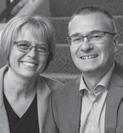
THAT SABBATH MORNING WE FELT THAT PERHAPS WE COULD LEARN SOMETHING FROM OUR EAGER FLY.
That Sabbath morning we felt that perhaps we could learn something from our eager fly. Something about hanging on to the solid Rock, something about the flexibility of really listening, something about adjusting to the changing headwinds without becoming rigid and defensive, something about hanging on to each other and refusing to let go. After all, Jesus said: “By this all will know that you are My disciples, if you have love for one another” (John 13:35). That kind of church will be as irresistible as honey to a fly.
Chantal J. Klingbeil, Ph.D., and Gerald A. Klingbeil, D.Litt., have served the Adventist Church for nearly three decades internationally as professors, TV host, editor, and associate director. They now live close to the beautiful city of Hamburg, Germany, and serve in the Hanseatic Conference of Seventh-day Adventists.

Whether you’re interested in becoming an international evangelist and preaching a series of meetings, or would like to serve through an AWR360° Health medical clinic as a medical professional or non-medical volunteer, we have various opportunities throughout the year. Start planning now:



Q:I grew up in the country 70 years ago. The complicated “science stuff” we have today didn’t exist, but the simple remedies worked. People in other countries have remedies that have lasted centuries without science. Why do you guys believe in science instead of faith?
A:Thank you for sharing your perspective. We appreciate the experience you must have gained over the years and a unique and valuable outlook on life and health. Many simple remedies have stood the test of time; traditional treatments, folk remedies passed on for generations, often have deep roots in practical experience and careful observation. Some of these remedies can be incredibly effective, and they’re an important part of our health heritage.
Yet the notion that one must choose between faith and science is a false dichotomy. In fact, faith and science can be viewed as complementary ways of understanding God’s creation. Rightly conducted and interpreted, modern science does not replace faith or inspired counsel, but works alongside them. True science is really just a systematic way of learning and understanding the world around us, including why some of those old remedies work so well. It helps us refine and improve on what we already know. So rather than being a “faith killer,” it can serve as a “faith enhancer.”
May we suggest you consider true science as a tool, like a good pair of reading glasses? It doesn’t change the book you’re reading, but it can help you see the details more clearly. In the same way, true science helps us understand and sometimes improve upon traditional remedies. The Bible encourages the pursuit of knowledge and understanding of the natural world. Proverbs 25:2 states, “It is the glory of
God to conceal a matter; to search out a matter is the glory of kings” (NIV). This verse suggests that God intends for humans to explore and discover the intricacies of His creation.
First Thessalonians 5:21 advises to “test all things; hold fast what is good.” Science provides a method to test claims and dispel superstitions that may contradict biblical truth. Our modern scientific understanding of health and disease has dispelled many harmful superstitions about illness and healing. Faith itself is based on evidence, and science is an evidence generator. We can thank God for giving us the wherewithal to learn.
Many early scientists, such as Johannes Kepler and Isaac Newton, were motivated by their faith to study the natural world, seeing it as a way to understand God’s handiwork better. Francis Bacon, considered one of the fathers of the scientific method, proposed the concept of “two books”—the book of Scripture (the Bible) and the book of nature. He argued that both were authored by God and therefore could not contradict each other when properly understood. But both faith and science require intellectual humility, acknowledging that our understanding is limited and always incomplete. We hope you can embrace true science as a gift from God and incorporate this into your view of His marvelous grace.
Peter N. Landless, a board-certified nuclear cardiologist, is director of Adventist Health Ministries at the General Conference. Zeno L. Charles-Marcel , a board-certified internist, is an associate director of Adventist Health Ministries at the General Conference.

Talking is not always necessary.
Ihad nearly forgotten who she was. We had attended the same church, but rarely interacted. Her name was Laura. 1
After some time, she and her husband stopped attending church and, once I went off to college, I never really saw or thought of them again until one day, while I was on a school break, my mother told me that we needed to visit Laura. Laura was dying from a terminal illness. I agreed to go; it was the right thing to do.
Soon, however, feelings of discomfort began creeping in. Situations involving death, serious illness, or suffering transform me into an awkward teenager, not knowing what to say or do except stare and smile while nervously seeking a quick
exit. On our way to Laura’s home, we made a quick stop at a grocery store, and my mother went in, perhaps to get a sympathy card. While I waited in the car, I reached for a Bible in hopes of finding some inspiration for what to say to console a dying woman. “God, help me know what to say to Laura,” I prayed. “I do not have the right words for this situation. Please show me. In Jesus’ name, amen.”
In that moment God brought a Scripture song from 2 Corinthians 4:16-18 to my memory. It was one we often sang when I was in academy. “Therefore we do not lose heart. Even though our outward man is perishing, yet the inward man is being renewed day by day. For our light affliction, which is but for a moment, is working for us a far more exceeding and eternal
weight of glory, while we do not look at the things which are seen, but at the things which are not seen. For the things which are seen are temporary, but the things which are not seen are eternal.”
“Thank You, God!” I exhaled in relief. “Now I know what to share with Laura.” I was grateful for the answered prayer and relieved that I finally had something to say. Little did I know that God would turn the tables on me very soon.
When we arrived at Laura’s home, her husband greeted us, and we followed him into the living room, where she lay back in a recliner. She was pale and thin, with a small blanket to keep her warm and comfortable. It was saddening to see, and those awkward feelings tried to overwhelm me: Be strong, Mayri; get over yourself, I thought, internally shaking myself sober. As we sat down and started conversing I admired my mother’s ability to say the right things. Meanwhile, I mentally prepared myself for just the right moment to share the Bible verses God had shown me. I quietly assured myself that the prepared scriptures would surely bring her some much-needed comfort. My thoughts of self-preparation were suddenly interrupted by a weak but confident voice. “Mayri, reach for that Bible on the table over there.”
After I grabbed the large, worn Bible, I sat beside her. The next thing she said pleasantly surprised me: “Turn to 2 Corinthians 4:16-18 and read those verses for me.” A tiny smile crept onto my face as I read the verses out loud—the same verses God had shown me on the way to Laura’s house.
She thanked me for reading, then shared that those were some of her favorite verses and they held a special meaning for her during this time of suffering. I was silenced by the wonderful reality that God had spoken for me and to me, through her. I had arrived intending to bless her, but ended up being blessed by her. The remainder of the conversation is gone from my memory. A few weeks later her momentary affliction ended in sleep. I hope that her last moments were peaceful and that one day I can thank her for speaking wisdom into my life.
Every time I read 2 Corinthians 4:16-18 I think of Laura. That experience taught me that I should
Maybe it is a time for us to listen more than we speak, to empathize with others and their grieving process, to see God at work in their lives.
not worry so much about what I am supposed to say to those who are suffering or dying, but to give the silent comfort of companionship and empathy, and to let them speak to me.
We may often feel that times of grief and suffering are the perfect opportunity to share extra words of wisdom, more Bible verses, and motivational lines. But maybe it is a time to be quiet, to let God’s living Word and loving Comforter speak through our presence, shared tears, warm embraces, and acts of patient love. Maybe it is a time for us to listen more than we speak, to empathize with others and their grieving process, to see God at work in their lives.
How can we bestow this kind of comfort? Because it has been freely given to us by God Himself. Second Corinthians 1:3, 4 tells us, “Praise the God and Father of our Lord Jesus Christ, the Father of mercies and the God of all comfort. He comforts us in all our affliction, so that we may be able to comfort those who are in any kind of affliction, through the comfort we ourselves receive from God” (HCSB).2
May we all, in our momentary affliction, be evidence of the unseen and eternal through the ways we love, comfort, and grieve.
1 Not her real name.
2 Texts credited to HCSB are taken from the Holman Christian Standard Bible, copyright © 1999, 2000, 2002, 2003, 2009 by Holman Bible Publishers. Used by permission.
Mayri Clarke writes from Tennessee.
Help Holbrook Indian School (HIS) students experience an unforgettable week of learning in the great outdoors at Rocky Mountain National Park this September!

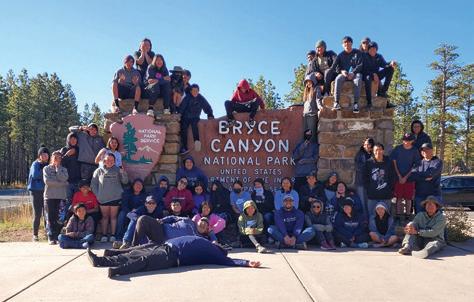
Outdoor School plays a vital role in allowing HIS students to see unique places, get out of their comfort zone, and learn in new ways. By making a gift to HIS Outdoor School, you are helping to provide all of the travel expenses and essentials needed for week-long camping excursions, including necessary equipment such as tents and sleeping bags.
Will you help provide Outdoor School for HIS students?

To support Outdoor School, call (928) 524-6845 (ext. 109) or visit: HolbrookIndianSchool.org/Outdoors

On October 8, 1891, the Foreign Mission Board of the General Conference of Seventh-day Adventists sent Lawrence C. Chadwick, a board member, to go from Battle Creek, Michigan, on a world tour that included Central America, the West Indies, South America, South Africa, West Africa, and Britain. Chadwick spent several months in West Africa in late 1892. Ghana was the last country on his West African tour and where he enjoyed his adventures the most. Chadwick had the opportunity to work closely with Francis Dolphijn and his small band of Adventist believers. He did not, however, baptize anyone, preferring to defer that to someone else.
The first resident missionaries to Ghana, Karl G. Rudolph and Edward L. Sanford, arrived at Apam, on February 22, 1894, amid a rousing welcome from Dolphijn and his team of believers. With Dolphijn’s guidance the team walked for miles along the shoreline of Ghana, preaching, teaching, and scattering Adventist literature. Unfortunately, after a short five-month stay, Sanford left Ghana because of persistent malaria attacks. Rudolph, however, managed to cope for one and a half years before returning to America. After the first seven months in Apam, Rudolph relocated the mission headquarters to Cape Coast, about 28 miles west of Apam (all in the Central Region of Ghana).
The General Conference of Seventh-day Adventists in July 1895 planned to augment the foreign workforce in Ghana with a new group of missionaries under the leadership of Dudley U. Hale. Other members of the team included George T. Kerr, Mrs. Eva E. Kerr, and G. P. Riggs, who arrived at Cape Coast, the new headquarters of the mission in Ghana, October 1895. They were warmly welcomed by Karl Rudolph, the only remaining foreign Adventist missionary in Ghana. After a month of familiarization and acclimatization, Dudley Hale began a search for the ideal place to locate the mission station. On Sunday, November 24, 1895, Hale, Francis Dolphijn, and his son, Isaac, trekked westward of Cape Coast to Elmina, Shama, Sekondi, to as far as Axim (85 miles away) and returned to Cape Coast on December 5, 1895.
Through the work of Hale at Cape Coast, George Peter Grant finally committed himself totally to the Adventist faith in 1896, despite opposition and threats from both his wife and employers. He
With Dolphijn’s guidance the team walked for miles along the shoreline of Ghana, preaching, teaching, and scattering Adventist literature.
submitted his resignation letter to the reputable trading firm he was working with for their refusal to grant him Sabbaths off, and joined the Adventist labor force as a literature evangelist. Finally, on Sabbath, March 27, 1897, after more than a decade wait, Pastor Dudley Hale baptized Francis Dolphijn and his two sons, Isaac and Fred, together with George Peter Grant, as Seventh-day Adventists. It was the first Adventist baptism in West Africa.
Earlier in November 1896 Hale had visited Dolphijn in Apam and spoke about the need to join the Adventist workforce. Dolphijn accepted the invitation and officially became a full-time worker of the church from January 1, 1897, together with George Peter Grant, making them the first two Ghanaians to be formally employed by the Seventh-day Adventist Church on a full-time basis. Dolphijn was transferred to Sekondi (a town 50 miles west of Cape Coast), where he worked tirelessly in proclaiming his faith until he retired from active service. While in Sekondi, he served as a teacher at the Adventist school in Kikam. Upon his retirement Dolphijn returned to Apam and stayed under the care of his daughter Joyce, since he did not remarry after the death of his wife.
Sadly, although all three of Francis Dolphijn’s children were coworkers with their father in his lifetime, they left the Adventist Church after his death. Dolphijn died in Apam sometime between 1910 and 1914. Though he had helped build churches in various parts of the country, Dolphijn had never built one in his hometown, Apam, so his funeral service took place in a Methodist church in Apam. Francis Dolphijn was the first indigenous missionary of the Seventh-day Adventist Church in Ghana.
* The primary source for this article is Kofi Owusu-Mensa, Ghana Seventh-day Adventism: A History (Accra: Advent Press, 2005).
Nii Lante Thompson is a ministerial secretary and Family Ministries director in the Southern Ghana Union Conference.

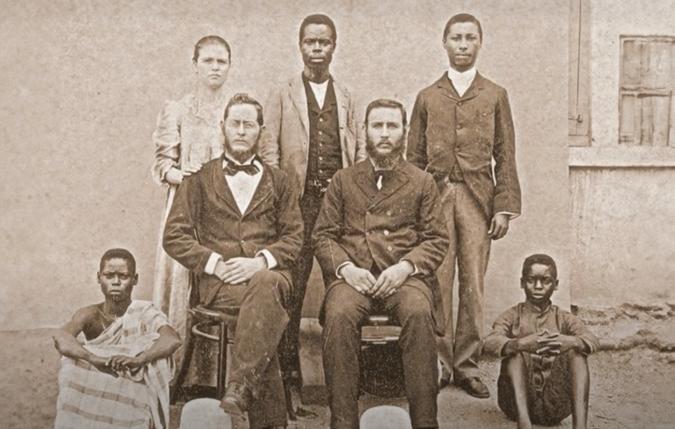
Front row, left to right: Isaac Dolphijn, George T. Kerr, Dudley Hale, Fred Dolphijn. Back row, left to right: Eva Kerr, Francis Dolphijn (center), George Grant.
GWITHIN A YEAR FRANCIS DOLPHIJN HAD RAISED A COMPANY OF 33 BELIEVERS WHO WERE KEEPING THE SABBATH.
enerally missionaries are sent from their home country to foreign lands to promote their faith. But this was not the case with Francis Dolphijn. Born in the coastal town of Apam, in the Central Region of Ghana, Dolphijn— whose grandfather served in the Dutch Army, stationed in the then Gold Coast (now Ghana) in the late fifteenth century—was a merchant by profession. He traded in rubber, palm products, gold, cotton goods, and hardware. Dolphijn was born into a Methodist Christian family and initially found it hard to accept the Adventist faith when his friend, colleague, and former Methodist believer William Dawson came from the United States of America with his new conviction.1
William had left the shores of Ghana for America in the late 1870s and returned in the late 1880s as a Seventh-day Adventist. On arrival William made it a point to
share his newfound faith with all his friends and relatives. Attempts to woo Dolphijn into Adventism did not yield much until he received a copy of the tract Present Truth, an Adventist pamphlet published and distributed by the International Tract Society, from a sea captain who had anchored along the shores of Apam in January 1888. Dolphijn became so engrossed in the pamphlet that he cross-checked all the Bible texts cited in the tract, and on finding the sender’s address, he promptly requested more material. A month later he received a copy of Signs of the Times—another Adventist pamphlet. Within a year Francis Dolphijn had raised a company of 33 believers who were keeping the Sabbath, including his wife and three children, in his hometown, Apam. The group was very anxious to have a deeper knowledge about the Sabbath truth, and sought missionaries to be sent to them so they could be baptized.
